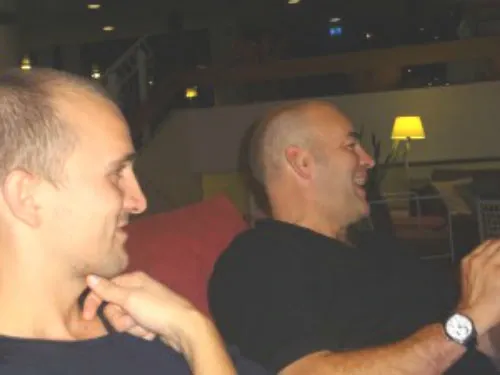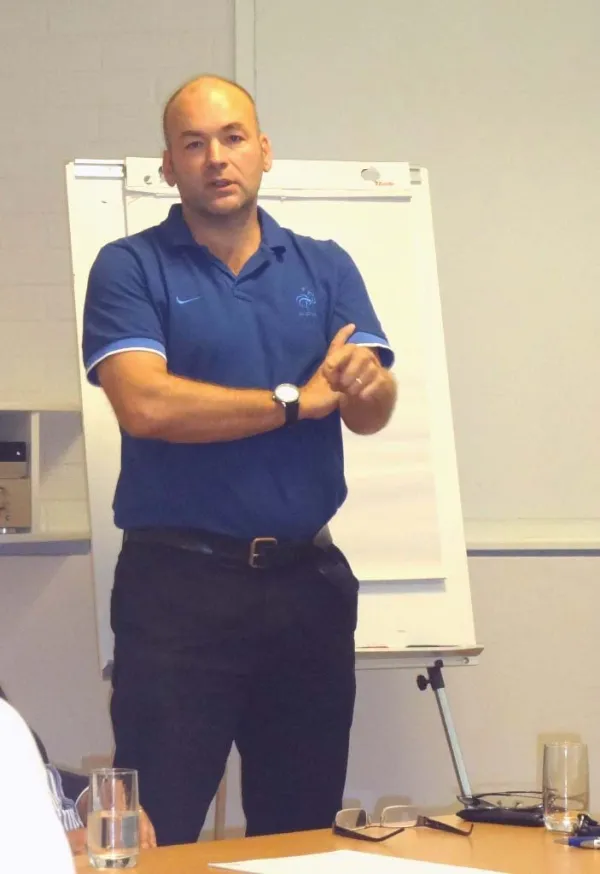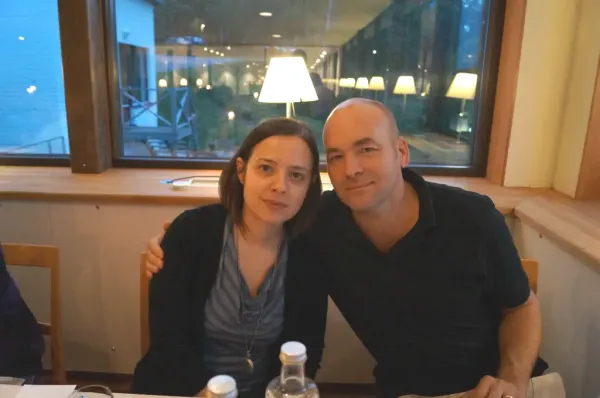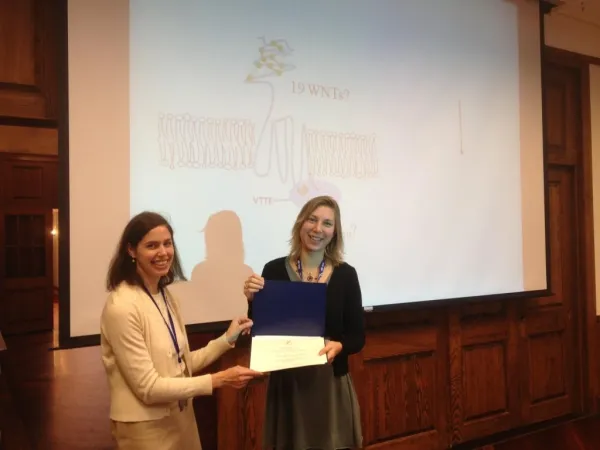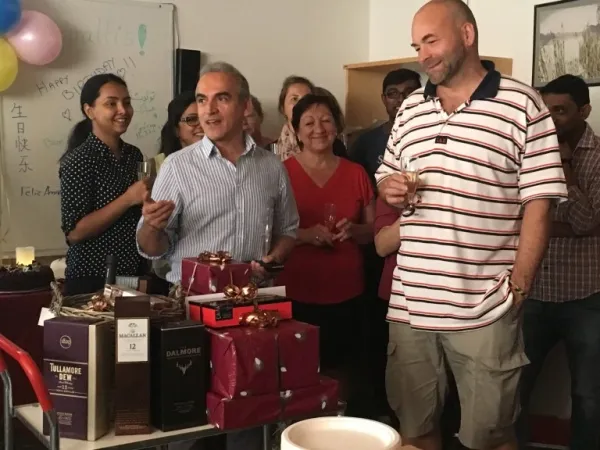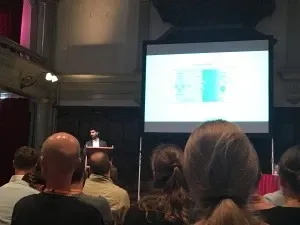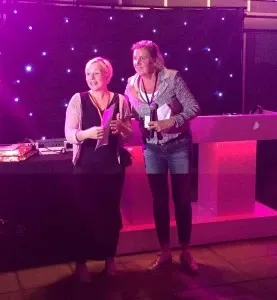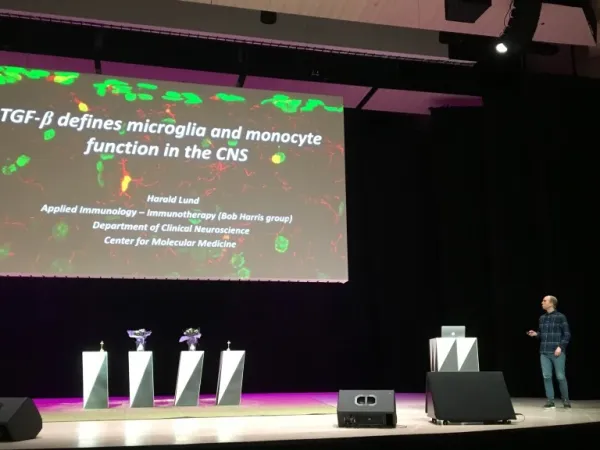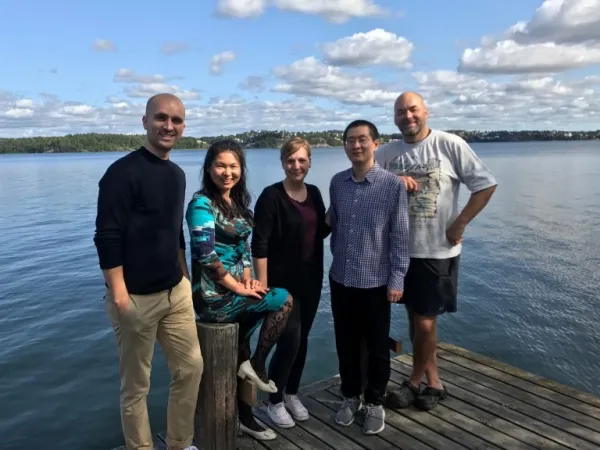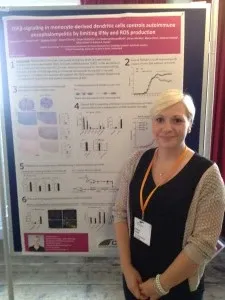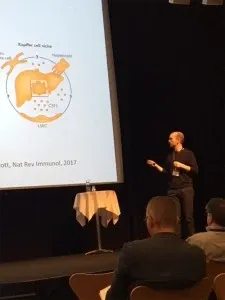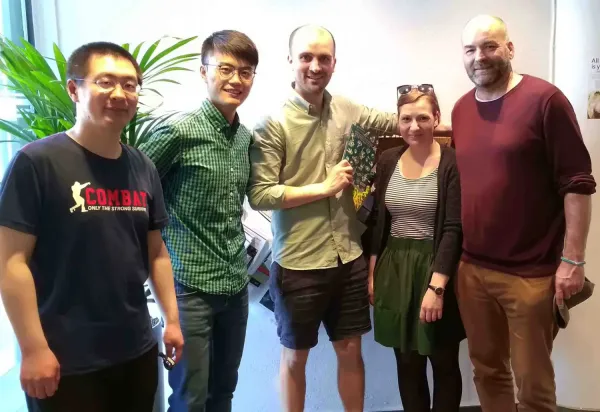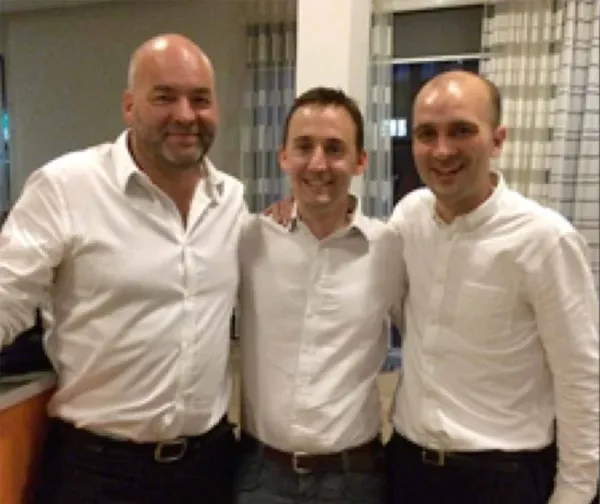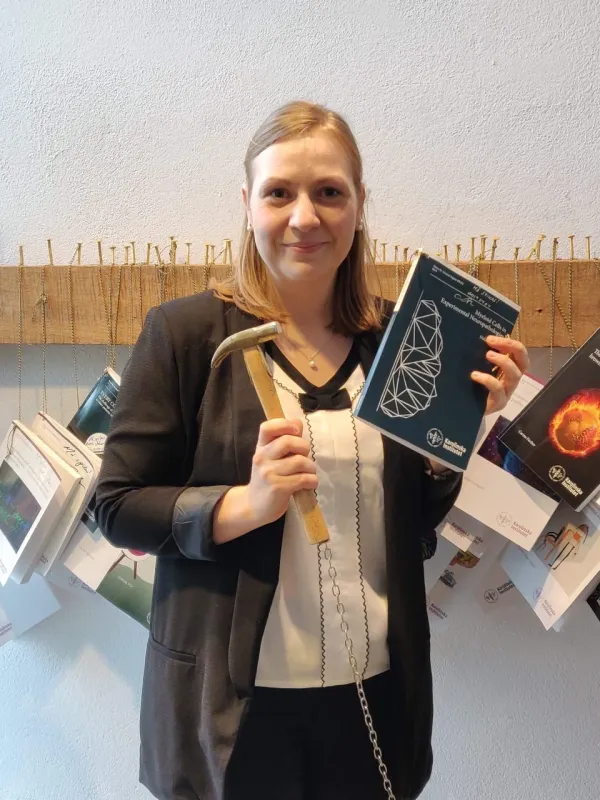
- >
- >
- Movement, Activity and Health – Eva Broström's research group
- Discovery and Elucidation of the mechanisms of Action of Tumour Selective Compunds – Sonia Lain Group
- Multidimensional health in old age – Amaia Calderón-Larrañaga group
- Molecular epidemiology of aging – Sara Hägg's research group
- Long noncoding RNA in the adipocyte – Alastair Kerr Research Group
- Leukemia niche – Hong Qian group
- Disease mechanisms in severe acute bacterial infections – Anna Norrby-Teglund group
- Gastrointestinal pediatric surgery – Tomas Wester's research group
- Developmental biology and regenerative medicine – Igor Adameyko's research group
- Experimental audiology – Barbara Canlon's research group
- Translational Immunology in Neuroinflammation – Olivia Thomas' research group
- Sickness absence, health and living conditions – Emilie Friberg's research group
- Health Systems and Policy – Cecilia Stålsby Lundborg's research group
- Endocrinology and autoimmune diseases – Research group Sophie Bensing
- Health economics of Alzheimer disease and other dementias – Linus Jönsson Group
- Epidemiology: Diet, contaminants and health – Agneta Åkesson's research group
- Neuronal circuits of anxiety – Janos Fuzik group
- Paediatric rheumatology – Research group Helena Erlandsson Harris
- Cardiovascular Epidemiology – Karin Leander research group
- Molecular cardiology – Research group Francesco Cosentino
- Björn Högberg group
- Regeneration mechanisms – Andras Simon's Group
- Assessing and managing chemical risks – Linda Schenk's research group
- Autoimmunity and adaptive immunity in rheumatic disease – Research group Vivianne Malmström
- Rheumatic systemic diseases – Team Marie Holmqvist
- Heart failure with reduced and preserved ejection fraction. Clinical and translational aspects. – Research group Lars Lund
- Christoph Ziegenhain Group
- Psychiatric epidemiology – Paul Lichtenstein's research group
- Structural basis of RNA biogenesis – Martin Hällberg's research group
- Hematopoietic Stem Cell Biology Group – Sten Eirik W. Jacobsen Lab
- Psychiatric Genetic Epidemiology – Sarah Bergen's research group
- Renal Medicine at Novum (Baxter Novum) – Bengt Lindholm Group
- Research groups in biochemistry
- Psychological treatment: internet and exposure – Brjánn Ljótsson's research group
- Research groups in immunology
- Research groups in ophthalmology
- Research groups in urology and nephrology
- Research groups in sociology
- Integrative physiology – Juleen Zierath and Anna Krook
- Hormonal signalling and cancer – Cecilia Williams research group
- Cell Biology of Cancer – Staffan Strömblad's research group
- Chronic inflammation with focus on rheumatology and cancer – Research group Per-Johan Jakobsson
- Health services and social work research – Lena Von Koch's research group
- Human Translational Genetics – Stefano Romeo Group
- Clinical Pancreatology – Miroslav Vujasinovic research group
- Hemostasis and Thrombosis – Mika Skeppholms research group
- Amyotrophic Lateral Sclerosis - ALS – Caroline Ingre's research group
- Saving the brain in critically ill neonates – Ulrika Ådén's research group
- Regulatory Transcriptomics – Kutter group
- NeuroimAging – Grégoria Kalpouzos group
- Section of Pharmacogenetics – MIS-lab
- Biological and clinical aspects of the myelodysplastic syndrome – Magnus Tobiasson group
- Human innate lymphoid cell lab – Jenny Mjösberg group
- Viruses and their interactions with the immune system – Sara Gredmark Russ group
- Protein degradation pathways – Helin Norberg's research group
- Translational Auditory Neuroscience – Christopher Cederroth's research group
- Neuroradiology: Neurodegeneration and Neuroinflammation – Tobias Granberg's research group
- Tumor Immunology and Immunotherapy Group – Dhifaf Sarhan
- Causal inference in epidemiologic research – Arvid Sjölander's research group
- The role of autophagy in Aβ metabolism and neurodegeneration in Alzheimer’s disease – Per Nilsson group
- Darreh-Shori's Lab/group
- PROCOME – Hanna Öfverström's and Marta Roczniewska's group
- Molecular brain imaging of neurodegenerative disorders – Andrea Varrone's research group
- Alcohol and Drug Epidemiology – Mats Ramstedt's research group
- Anxiety related disoders and genetics – Christian Rück's research group
- Psychotherapy Research – Tobias Lundgren's research group
- Human olfaction – Mats J. Olsson's research group
- Tissue stem cells and aging – Pekka Katajisto's Group
- SOSVASC – David Lindström's research group
- Yenan Bryceson group
- Epidemiology of sarcoidosis and systemic lupus erythematosus – Team Elizabeth Arkema
- Viral genomics and metagenomics – Tobias Allander Group
- Defining the metabolic signatures of tissue resident human ILCs – Chris Tibbitt team
- Human papillomavirus which causes cervical cancer – Research Group Karin Sundström
- Research groups in bioinformatics and systems biology
- Cognitive epidemiology – Bo Melin's research group
- Gilad Silberberg group
- Research groups in oto-rhino-laryngology and logopaedics
- Immunoregulation of environmental-induced airway inflammation in severe asthma and bronchiectasis – Apostolos Bossios's research group
- Multimorbidity and frailty in older adults – Davide Liborio Vetrano group
- Psychiatric and pharmaco-epidemiology – Zheng Chang's research group
- Charting normal and malignant hematopoiesis – Team Joakim Dahlin
- Molecular mechanisms governing oxygen homeostasis in development, evolution, and disease – Kragesteen's research group
- Precision Medicine – Infrastructure team
- Research groups in medical epigenetics and epigenomics
- Medical sensors and diagnostics – Team Onur Parlak
- Uncovering the molecular and physical principles governing early embryonic division and nuclear organization – Jan Ellenberg Group
- Nanoscale lipid flux architecture – Veijo Salo’s Research Group
- Pediatric and respiratory epidemiology – Catarina Almqvist Malmros' research group
- Sexual and Reproductive Health – Marie Klingberg-Allvin research group
- Angiogenesis, Cancer, Metabolic disease, Cardiovascular disease, Eye disease – Yihai Cao Group
- Cardiovascular and psychosocial health in resilience and healthy brain aging – Chengxuan Qiu Group
- Translational Psychiatry – Catharina Lavebratt's research group
- Rare metabolic liver diseases, coagulation and hepatocellular carcinoma – Stål and Wahlin research group
- Blood Engineering – Vanessa Lundin group
- Development, regulation and function of human innate lymphoid cells throughout life – Jakob Michaëlsson group
- Clinical Genetics – Richard Rosenquist Brandell's research group
- Oxysterols – Ingemar Björkhem and Ulf Diczfalusy research
- Molecular exercise physiology – Carl Johan Sundberg's research group
- Large-scale Network Connectivity in the Human Brain – Peter Fransson's research group
- Environmental physiology
- The Systems Virology Lab – Ujjwal Neogi
- Cancer Cell Invasion – Marco Gerling's research group
- Molecular brain imaging, neuropsychopharmacology, depression and anxiety disorders – Johan Lundberg's research group
- Organization and operation of postural neuronal networks in health and disease – Tatiana Deliagina group
- Paediatrics – Anna Lindholm Olinder's research group
- Petzold group
- Molecular and epidemiological studies of ascending aortic aneurysms – Research group Hanna Björck
- Prevention, Intervention and Mechanisms in Public Health (PRIME Health) – Cecilia Magnusson's research group
- The interplay between circadian 3D genome organization and metabolism in complex diseases – Anita Göndör's Group
- Reconstructive Plastic Surgery and Global Surgery – Jenny Löfgren's research group
- Real-world effectiveness of psychopharmacological treatment – Jari Tiihonen's Research Group
- Center for Heart Failure and Arrhythmia – Gianluigi Savarese
- Sports Medicine – Anders Stålman's research group
- Women's Mental Health Epidemiology – Donghao Lu Lab
- The SMC complexes, chromosome dynamics and stability – Camilla Björkegren's Group
- Extracellular vesicles in immunity – Research group Susanne Gabrielsson
- Precision Cancer Medicine in Lung Cancer - Preclinical, Translational & Clinical Research – Simon Ekman's research group
- RNA-guided DNA repair and cancer – Marianne Farnebo's research group
- Laboratory of translational fertility preservation – Kenny Rodriguez-Wallberg's group
- Research groups in cancer and oncology
- Common Mental Disorders and Behavioral Medicine in Primary Care – Erik Hedman's research group
- Neuronal membrane trafficking – Oleg Shupliakov group
- Research groups in paediatrics
- Biostatistics With Focus on Statistical Methods in Cancer Epidemiology and Screening – Keith Humphreys' research group
- Research groups in nanotechnology
- Gastroenterology – clinical epidemiology and clinical trials – Research group Ola Olén
- Precision engineering of T cells in vivo for therapies of cancer – William Nyberg team
- Protein Misfolding and Prevention by Molecular Chaperones in Cancer and Neurodegenerative Disease – Gefei Chen's research group
- Social Perception – Arvid Guterstam's research group
- Neuroepidemiology – Kyla McKay and Katarina Fink's research group
- Experimental growth research – Lars Sävendahl's research group
- Spinal circuits for whole-body motor coordination – Laurence Picton group
- Clinical HIV epidemiology and comorbidity – Christina Carlander Research group
- Head and neck pathology – Anders Näsman's Team
- Elias Arnér research group
- Gynecologic Cancer – Henrik Falconer's research group
- B cell biology, from immunodeficiency to cancer – Pan Hammarström Lab
- Developmental Cognitive Neuroscience – Torkel Klingberg group
- Rare Diseases – Ann Nordgren och Anna Lindstrand's research group
- Research on steatotic liver disease – Hagström Group
- Stem Cell Size – Jette Lengefeld Team
- Natural Killer Cell Biology and Cell Therapy – Kalle Malmberg group
- Mast Cell Biology – Research group Gunnar Nilsson
- Traumatic Brain Injuries and Neuromonitoring – Eric Thelin's research group
- Medical Statistics team
- Augmented Neurosurgery – Erik Edström and Adrian Elmi Terander's research group
- Molecular neurophysiology – Karima Chergui's research group
- Injuries Social Aetiology and Consequences (ISAC) – Lucie Laflamme's research group
- Unconventional T cells in human pathology – Andrea Ponzetta team
- Inflammation and immune regulation during infection – Team Christopher Sundling
- Orthopaedics – Anders Enocson's research group
- Endothelial dysfunction in atherosclerotic cardiovascular disease – Research Group John Pernow
- Clinical epidemiology of multiple sclerosis and inflammatory joint diseases – Team Thomas Frisell
- Cancer stem cells and clonal structure in acute lymphoblastic leukemia – Martin Enge's Group
- Mitochondrial metabolism in health and disease – Anna Wredenberg group
- Biomolecular Medicine and Advanced therapies- focus on delivery of RNA therapeutics – Research group Samir EL Andaloussi
- Antimicrobial resistance – Christian Giske research group
- Tissue immunology – Research group Helen Kaipe
- Health Economics and Economic Evaluation – Niklas Zethraeus' group
- Neuroimage affective treatment and individual variability laboratory (NATIV Lab) – Kristoffer Månsson's research group
- Stem Cell Biology – Jonas Muhr's Group
- VIVAC research group: Vaccines and Immunotherapies against Viruses And Cancer – Matti Sällberg
- The passage of the mRNP particle through the nuclear pore – Bertil Daneholt's research
- Pharmacoepidemiology – Team Björn Pasternak
- Therapeutic Immunology and Transfusion Medicine – Michael Uhlin’s research group
- Musculoskeletal conditions and sports medicine research – Iben Axén's research group
- Research groups in cancer and oncology
- Nutritional neuroscience – Janina Seubert's Research Group
- Tobias Karlsson's group
- Research groups in pharmacology and toxicology
- Precision Psychiatry – Lu Yi's research group
- Research groups in medicinal chemistry
- Agneta Richter-Dahlfors group
- Cancer epidemiology with focus on breast cancer and applied biostatistics – Anna Johansson's research group
- Autism, ADHD and other neurodevelopmental conditions – Sven Bölte's research group
- Twinstudies on health conditions and sickness absence – Pia Svedberg's research group
- Psychiatric comorbidity and intergenerational transmission of mental health problems – Erik Pettersson's research group
- Neuronal circuits of the Basal Ganglia – Maya Ketzef group
- Psychological Interventions - innovation, improvement and implementation – Viktor Kaldo's research group
- Susanna Ranta team
- Neurovascular diseases – Christina Sjöstrand research group
- Gonçalo Castelo-Branco Group
- Pediatric Neuroimmunology and Epilepsy – Ronny Wickström's research group
- Explores various cell signaling phenomena and their impact on critical biological and medical processes using advanced light microscopy – Per Uhlén Group
- Neural stem cells – Anna Falk group
- Diabetes and Associated Complications – Sergiu-Bogdan Catrina's research group
- Myelodysplastic syndromes – Eva Hellström Lindberg group
- Immune responses to human viral infections and cancer – Hans-Gustaf Ljunggren group
- Health services research in neurological conditions – Charlotte Ytterberg's research group
- Neurosurgery – Mikael A. Svensson's research group
- Westman neuroimaging group
- Stemcells and Inflammation – Lou Brundin's research group
- Pharmacological nitric oxide research – Jon Lundberg's research group
- Epidemiology of Psychiatric Conditions, Substance use and Social Environment (EPiCSS) – Emilie Agardh's & Renee Gardner's Research Group
- Autoimmune neurology – Jakob Theorell team
- Reducing antibiotic resistance – Research group Pontus Nauclér
- Orthopaedics – Karl Eriksson's research group
- Endocrine Surgery – Robert Bränström's research group
- Paediatrics – Inger Kull's research team
- Cancer proteogenomics - from methods to clinical applications – Janne Lehtiö's Group
- Cellular metabolism – Research group Roland Nilsson
- Primary Immunodeficiency, Innate Immunity and Antimicrobial peptides – Peter Bergman Research Group/The AMP-group
- Clinical Virology and Immunology – Annika Karlsson's research group
- Jussi Taipale Group
- Global Child Health and the Sustainable Development Goals – Tobias Alfvén's research group
- Topoisomerases, chromatin biology and cancer – Laura Baranello's group
- Stem cells and neural development – Johan Ericson's Group
- Vascular morphogenesis and function in health and disease – Lars Jakobsson group
- Epidemiology and Public Health Intervention Research (EPHIR) – Jette Möller's research group
- Epithelial stem cells in development and disease – Maria Genander's group
- Research Group Gustaf Edgren
- Drug discovery, pancreatic beta-cell regeneration – Olov Andersson's Group
- Unit of Biostatistics – Matteo Bottai
- Research groups in cardiology and cardiovascular diseases
- Sleep, cognition and health – John Axelsson's research group
- Research groups in infectious medicine
- Research groups in physiology and anatomy
- Cardiometabolic epidemiology and aging – Ida Karlsson's research group
- How the overview of research subjects is made
- Precision Cancer Control Group – Martin Eklund's research group
- Liver and monocyte remodelling in non-alcoholic fatty liver disease and cardiovascular disease – Rongrong Fan's research group
- Early childhood development and neurodevelopmental conditions – Terje Falck-Ytter's research group
- Mental health and social integration (Mente) – Ellenor Mittendorfer-Rutz's research group
- Mechanisms of protein aggregation and inhibition – Axel Abelein group
- Genetic and pharmacological epidemiology – Zeberg laboratory
- REACH – digital treatment and prevention – David Moulaee Conradsson's research group
- Mucosal immunology lab – Charlotte Thålin research group
- Stroke – Annika Lundströms research group
- Environment, nutrition and health – Anna Bergström's research group
- Genetic and epigenetic factors in asthma and allergy – Cilla Söderhäll's research group
- Cardiovascular epidemiology – Team Bruna Gigante
- Neurobiology of Stress and Treatment Response – Juan Pablo Lopez group
- Vascular Surgery – Ulf Hedin's research group
- Annika Bergquist group
- Acute myeloid leukemia – Sören Lehmann group
- Human tissue-resident NK cells – Niklas Björkström group
- Neuropsychoimmunology – Sophie Erhardt's research group
- Diabetes epidemiology – Sofia Carlsson's research group
- Stroke - Acute Intervention and Secondary Prevention – Niaz Ahmed's research group
- Molecular muscle physiology and pathophysiology – Lanner Lab
- Community nutrition and physical activity (CoNPA) – Liselotte Schäfer Elinder's research group
- Inflammatory bowel disease (IBD) – Research group Eduardo Villablanca
- CRISPR-based drug target discovery in cancer and autoimmunity – Research group Fredrik Wermeling
- Emergency care – Kristian Ängeby's research group
- Clinical Cancer Epidemiology – Research group Karin Ekström Smedby
- Cancer prevention and screening – Johannes Blom's research group
- Somatosensation – Patrik Ernfors group
- DNA replication & Cancer Genetics – Lemmens Group
- Laboratory testing for alcohol and drugs of abuse – Anders Helander research
- Anaesthesia and Intensive care – Rebecka Rubenson Wahlin/Anna Schandl's research group
- Jonas Fuxe Group
- SCF ubiquitin ligases, cell cycle, transcription and cancer development – Olle Sangfelt's Group
- Toxicological Mechanisms – Emma Wincent's research group
- Stem Cells in Tissue Homeostasis and Regenerative Medicine – Jonas Frisén's Group
- Urology – Olof Akre's research group
- The New World of Work – Theo Bodin's research group
- Midbrain dopaminergic neuron development
- Research group Michael Fored
- Neurobiology of pain & Therapeutics – Saida Hadjab Group
- Risk assessment – Mattias Öberg's research group
- Research groups in cell and molecular biology
- Developmental Psychology: Digital Media and ADHD – Lisa Thorell's research group
- Research groups in education and pedagogy
- Research groups in biostatistics and probability theory
- ESSI – Emotion regulation, Self-injury, Suicide, and Intervention – Johan Bjureberg's research group
- Medical ethics – Gert Helgesson's group
- Treatment of substance use disorders – Johan Franck's Research Group
- Sex hormones and sex differences in diseases of the brain – Ivan Nalvarte's research group
- Cilia in the brain – and their connections to human brain disorders – Peter Swoboda's research group
- Evidence-based methods in autism and ADHD – Tatja Hirvikoski's research group
- Long-Term Outcomes after Perioperative and Intensive Care – Max Bell research group
- Accelerating drug discovery using molecular modeling and machine learning – Andreas Luttens' group
- Pediatric Healthcare Science – Cecilia Bartholdson research group
- Digital Strategies for AF Detection and Outcome Prevention – Emma Svennberg Team
- Translational Pharmacology – Kent Jardemark's team
- Global and Sexual Health (GloSH) – Anna Mia Ekström's research group
- Medical Inflammation Research – Rikard Holmdahl group
- Neuro-infections & Neuroinflammation – Federico Iovino Group
- Clinical Chemistry and Blood Coagulation – Jovan Antovic's research group
- Translational research on human microbial infections and its consequences – Anders Sönnerborg's group
- Human tissue-resident NK cells in homeostasis and disease – Nicole Marquardt team
- Etiology and pathogenesis of type 1 diabetes – Malin Flodström-Tullberg group
- Oxygen sensing, cancer and intratumor heterogeneity – Schlisio Lab
- Genetic Epidemiology of Neuroinflammatory Disorders – Ingrid Kockum's research group
- Retina – Anders Kvanta's research group
- Glaucoma – Pete Williams' research group
- Leadership in healthcare and academia – Mia von Knorring's group
- Luminal gastroenterology – Research group Charlotte Hedin
- Identifying molecular signals in the genital mucosa that determine susceptibility to sexually transmitted infections – Research group Kristina Broliden
- Coronary heart disease – Research group Per Svensson
- Educational development – Matti Nikkola's group
- Post-transcriptional regulation in mitochondria – Joanna Rorbach group
- Cellular diversity is generated during development, neuronal identity – Johan Holmberg's Group
- Lipid handling in health and cardiometabolic disease – Research group Carolina Hagberg
- Renal glomerulus biology and diseases – Jaakko Patrakka group
- Research group Caroline Palm Apergi
- Precision pathology and tumor heterogeneity – Johan Hartman's Group
- Lifelong Learning in Health Care Contexts – Terese Stenfors' group
- Translational Arthritis Research – Team Bence Réthi
- Stem cells, Developmental Biology, Heart Disease, Heart Development, Genetics, Biotechnology – Kenneth R. Chien's group
- Urological cancer – Lars Egevad's Group
- The ubiquitin/proteasome system in neurodegenerative diseases and cancer – Nico Dantuma's Group
- Experimental alcohol- and drug dependence research – Vladana Vukojević research group
- Chronic inflammatory disease epidemiology – Research group Johan Askling
- Statistical and bioinformatics analyses of high-throughput molecular data – Yudi Pawitan's research group
- Urban environment and children´s and youth health – Olena Gruzieva's research group
- Research groups in laboratory medicine
- Research groups in medical biotechnology
- Research groups in physiotherapy
- Breast cancer epidemiology – Kamila Czene's research group
- Research groups in human computer interaction
- Research group Liv Eidsmo
- Preventive Medicine – Susanna Larsson's research group
- Transition to adulthood for individuals with neurodevelopmental conditions – Ulf Jonsson's team
- Function and Health in Respiratory and Cardiovascular Conditions – Malin Nygren-Bonnier's research group
- Laboratory of lymphocyte biology – Team Taras Kreslavskiy
- Translational and clinical research in acute myeloid leukemia – Team Martin Jädersten
- CEREBRA – Susanne Palmcrantz's research group
- Tissue immunosurveillance by cytotoxic lymphocytes – Takuya Sekine team
- Physical activity and Sports medicine with focus on prevention – Hagströmer research group
- Receptor biology and signaling – Schulte Lab
- Neurobiology of Obesity – Alessandro Furlan group
- Upper GI Surgery – Jesper Lagergren's research group
- Sepsis and COVID-19 – Kristoffer Strålin Group
- Harnessing Neutrophils for Precision Cell Therapy against solid tumors – Roland Fiskesund Team
- Human T cell immunity to evolving viruses and cancers – Marcus Buggert group
- Neuroradiology - MRI physics – Stefan Skare's research group
- Wilhelm lab
- Inflammatory responses in cancer and autoimmunity – Mikael Karlsson's Group
- Cultural Medicine – Solvig Ekblad's unit
- Working life, ergonomics, psychosocial factors, and health – Research group Daniel Falkstedt
- Aging and health – Welmer's research group
- NK Cell Recognition – Klas Kärre Group
- Computational Breast Imaging – Fredrik Strand's Group
- Drug treatment – Erik Eliasson research group
- Neural differentiation as a strategy for neuroblastoma treatment – Marie Arsenian Henriksson Group
- Cancer immunotherapy – Mattias Carlsten group
- Cell-based immune therapy for cancer – Andreas Lundqvist's Group
- Basic molecular structure of human skin – Lars Norlén's research
- Reproductive, Perinatal and Pediatric Epidemiology – Research group Olof Stephansson
- Research group Erik Melén
- Research group Joel Nordin
- MINT – Klas Karlgren's team
- Translational breast cancer research – Theodoros Foukakis' Group
- Genes function and molecular bases of diseases – Research group Magdalena Paolino
- Homeostasis and tissue repair mechanisms in the mammalian system, pericytes, stem cells – Christian Göritz Group
- The Perinatal Epidemiology Lifecourse Lab – Team Neda Razaz
- Experimental Cancer Medicine (ECM)
- Research group Therese Djärv
- Molecular and cellular neuroendocrinology – Tibor Harkany group
- Neuropsychiatric disorders – Håkan Karlsson group
- Research groups in dermatology and venereal diseases
- Evidence-based practice: prevention, intervention and implementation – Pia Enebrink's research group
- Research groups in radiology and medical imaging
- Research groups in psychiatry
- Maria Eriksdotter research group
- Research groups in precision medicine
- Breast cancer surgery – Jana de Boniface's research group
- ICare – Ann Langius-Eklöf's research group
- Immunology and Chronic Disease – Johan Frostegård's research group
- Health in Everyday Life (HELD) – Susanne Guidetti's research group
- Center for Resuscitation Science – Jacob Hollenberg's research group
- Applied Developmental Neurobiology – Carl Sellgren research group
- Global Reproductive Outreach & Wellness (GROW) – Michael Wells
- Mats Marshall Heyman research group
- SLE/APS/Vasculitis group – Research group Aleksandra Antovic
- Development of autonomic control – Herlenius Research
- Maintenance and expression of mtDNA in disease and ageing – Nils-Göran Larsson Group
- Neuropharmacology - Movement Disorders – Per Svenningsson's research group
- Somatosensation & Gargalesis – Konstantina Kilteni group
- Signal Transduction – Ismael Valladolid Acebes' research group
- Microbiome and Infections – Piotr Nowak Research Group
- Immunological tolerance and transfusion immunology – Petter Höglund group
- Immunopathogenesis and new therapeutic strategies in tuberculosis – Susanna Brighenti group
- Pain and Brain Imaging – Karin Jensen's research group
- Susanne Nylén group
- Hand surgery – Maria Wilckes Research group
- Environmental impact on pulmonary host defence and chronic airflow obstruction – Anders Lindén's research group
- Rehabilitation, collaboration and aging – Elisabeth Rydwik's research group
- Tuberculosis Aerobiology – Antonio Rothfuchs group
- Oscar Fernandez-Capetillo group
- Diversity within the T cell response, T cell memory – Research group Carmen Gerlach
- Clinical and translational melanoma research – Hanna Eriksson's Group
- Meiotic chromosome segregation – Christer Höög's research group
- B cells and autoantibodies in rheumatic disease – Team Caroline Grönwall
- Precision medicine in lymphoid malignancies including CLL; from new targets to real-world assessments – Anders Österborg's Group
- Research group for Cancer evolution
- Jiri Bartek group
- Translational Cardiology (@TransCardio) – Research group Magnus Bäck
- Gene regulation, genome-wide experimental and computational techniques – Rickard Sandberg's Group
- The Helleday Laboratory focuses on harnessing defects in the DNA damage response and metabolism to develop novel therapies
- Small RNAs in cancer development – Weng-Onn Lui's Team
- Geriatric pharmacoepidemiology – Kristina Johnell's research group
- Molecular neurodevelopment and neuro-oncology – Ola Hermanson group
- Research groups in anesthesiology and intensive care
- Gastrointestinal epidemiology – Jonas Ludvigsson's research group
- Health inequalities and minority stress – Richard Bränström's research group
- Research groups in microbiology
- Research groups in orthopaedics
- Hereditary hematological malignancies – Bianca Tesi team
- Lars Holmgren's Group
- Substance use prevention – Johanna Gripenberg's research group
- Perioperative care – Ulrica Nilsson's research group
- Mechanisms behind HIV-1 latency and rebound – Peter Svensson's group
- ENGAGE- Enacting health and change through everyday activity – Patomella group
- Diagnosis and treatment of children with asthma and allergy: from molecular diagnosis to intervention – Jon Konradsen's research group
- Translational research in childhood cancer and histiocytic diseases – Nikolas Herold Research group
- Reproductive Health/Reproductive Medicine – Kristina Gemzell Danielsson's research group
- Malin Holzmann's research group
- Radiation therapy/ Radiation Oncology – Pehr Lind Group
- Reproductive endocrinology and metabolism – Elisabet Stener-Victorin's research group
- Tissue engineering – Magdalena Fossum team
- Inflammation and metabolism – Nicolas Pillon's team
- Neurobiology of Sensory Systems – François Lallemend group
- Experimental Traumatology Research Unit
- Genetic Modification of NK cells for Optimized Functions against Cancer – Arnika Wagner team
- NK cells in the development of adaptive immune responses – Benedict Chambers team
- Molecular pain research – Camilla Svensson's research group
- Brain Connectomics – Joana Pereira's research group
- Genomic Science and RNA Biology – Vicent Pelechano group
- Immunotherapy – Robert Harris' research group
- Infectious diseases/Venhälsan – Jaran Eriksen's research group
- Musculoskeletal disorders from a biopsychosocial perspective – Wim Grooten's research group
- Hjerling-Leffler group
- Respiratory and invasive infections and microbial pathogenesis – Birgitta Henriques-Normark Laboratory
- Multimodal Brain Imaging – Daniel Lundqvist's research group
- Obsessive - Compulsive and Related Disorders Across the Lifespan – David Mataix-Cols research group
- With a focus on proteins for better cancer treatments – Pär Nordlund's Group
- Precision cancer medicine and precision radiotherapy in lung cancer - from molecular mechanisms/biomarkers to clinical trials – Kristina Viktorsson's team
- Cancer Bioinformatics – Nick Tobin's Team
- Lipoproteins and the Immune System – Research group Stephen Malin
- Equity and Health Policy (EHP) – Ann Liljas' research group
- Effects of hypoxia in physiological and pathological contexts, Hypoxia Inducible Factors (HIF) – Randall Johnson's Group
- Chemistry II – Jesper Z. Haeggström group
- Genomic analysis of parasites and viruses, metagenomic sequencing – Björn Andersson's Group
- Translational control of cancer – Ola Larsson's Group
- Gastrointestinal Surgery KI SÖS – Gabriel Sandblom's research group
- Understanding the mechanisms behind hantavirus-mediated pathogenesis – Jonas Klingström group
- The Gynaecological research team – Elisabeth Epstein
- Understanding how life develops – Emma Andersson's Group
- Statistical methods in epidemiology – Paul Dickman's research group
- Neurons and Neural Networks – Ole Kiehn group
- Research groups in developmental biology
- Behavioral, Resilience and Digital Health in Pain – Rikard Wicksell’s research group
- Research groups in neurology
- Research groups in epidemiology, global public health and social medicine
- Nordic Brain Network – Miia Kivipelto's research group
- Resilience and mental health – Serhiy Dekhtyar group
- Forensic behavioral and neuroscience – Katarina Howner's Research Group
- Immune Engineering – Team Leo Hanke
- Chemical and physical exposure in the work environment and health – Jenny Selander's research group
- Mechanobiology of cardiac regeneration – Elif Eroglu's Group
- Tumors of the female genital organs – Miriam Mints' research group
- Psychoneuroimmunology – Mats Lekander's research group
- Mechanisms of malignant hematopoiesis – Pedro Moura team
- Neuroplasticity and Regeneration – Konstantinos Ampatzis group
- Paediatric cell and molecular biology – Hjalmar Brismar's research group
- Quantitative Biology of the Nucleus – Magda Bienko Group
- Cardiometabolic factors, brain aging, and dementia care – Weili Xu group
- Cognitive Neuroscience of Body and Self – Henrik Ehrsson Group
- Surgical Care Science – Pernilla Lagergren's research group
- Clinical and translational studies on viral hepatitis – Soo Aleman group
- Cell and Gene Therapy – Evren Alici group
- Personalized Medicine and Drug Development – Lauschke-lab
- Electrophysiological neuropharmacology – Göran Engberg's research group
- Mechanisms of Pain and Treatment – Eva Kosek's research group
- Functional (Epi)genomics of Neuroinflammatory Diseases – Maja Jagodic's research group
- Molecular basis of gene regulation of diseases – Carsten Daub's research group
- Health risk assessment methodology – Anna Beronius' group
- Medical genetics – Catharina Larsson's Group
- Translational Genetics of Neurodegenerative disease – Caroline Graff's research group
- Development, transcription factors, neurons, dopamine – Thomas Perlmann's Group
- Novel targeted therapies in cancer to overcome drug resistance – Katja Pokrovskaja Tamm's Team
- Clinical and translational research within lupus and autoimmunity – Team Ioannis Parodis
- Cell cycle, mitotic entry, and DNA-damage checkpoints – Arne Lindqvist's Group
- Breast Surgery – Irma Fredriksson's research group
- Laura Orellana's Group
- Research group Ali Mirazimi
- Early drug discovery research in chronic inflammatory diseases – Research group Michael Sundström
- Integrative Physiology – Juleen Zierath's research group
- Simon Elsässer group
- Clinical Neuroimmunology and Immunomodulation – Fredrik Piehl's research group
- Understanding mechanisms of vaccination – Research group Karin Loré
- Systems regenerative neurobiology – Enric Llorens Group
- Clinicial Cancer Genomics – Johan Lindberg's research group
- Jeanette Hellgren Kotaleski group
- Brain control of food intake and body weight – Björn Meister group
- Research groups in endocrinology and diabetes
- Research groups in gastroenterology and hepatology
- Research groups in neurosciences
- Research groups in respiratory medicine and allergy
- Caring in Community Care – Zarina Nahar Kabir's research group
- Molecular mapping of the nervous system in health and disease – Jan Mulder group
- Child and adolescent psychiatry – Jens Högström's research group
- Genetic mechanisms of ageing – Maria Eriksson's research group
- Digital Psychiatry – Philip Lindner's research group
- Synaesthesia, autism and perception – Janina Neufeld's team
- Vascular complications in cardiometabolic disease – Team Zhichao Zhou
- Research groups in odontology
- Neuroimmunovascular biology – Harald Lund's team
- Translational Molecular Imaging – Nordberg Lab
- NEUROPLASTICITY – DAGLIYAN GROUP
- Intracellular Mycobacterium Tuberculosis – Martin Rottenberg group
- Developmental and Translational Neurobiology – Cristiana Cruceanu's research group
- Microbiota–gut–brain axis and neurodevelopment – Rochellys Diaz Heijtz group
- Thoracic Surgery – Anders Franco-Cereceda's research group
- Electrophysiology – Mats Jensen-Urstad group
- Role of T cells in human host defense – Johan Sandberg group
- Germ cell biology and developmental programming in epigenetic inheritance of diseases – Qiaolin Deng's research group
- Unit for Bioentrepreneurship – Hanna Jansson's group
- Health informatics – Sabine Koch's group
- Cancer, rapid ageing and nutrition – Martin Bergö's research group
- Clinical radiation therapy – Åsa Carlsson Tedgren's Group
- TRANslational Theranostics Group – Thuy Tran
- Pathogenic pathways in Alzheimer Disease – Lars Tjernberg's research group
- Hematological and solid tumors – Research group Xu Dawei
- Developmental Neurogenomics – Michael Ratz's Group
- Notch signaling, ES cells, myogenic and vascular progenit breast cancer – Urban Lendahl's Group
- Particle toxicology – Hanna Karlsson's group
- Mitochondrial dysfunction in Alzheimer Disease – Maria Ankarcrona's research group
- Molecular pathology of the lung and pleura – Katalin Dobra's Group
- Late effects and cancer survivorship after diagnosis and treatment of aggressive lymphoma – Team Sandra Eloranta
- Research Group Anna Nopp
- Coding and non-coding RNAs in cancer – Per Hydbring's Team
- Research group Mikael Björnstedt
- Sister chromatid cohesion in DNA damage responses, DSB repair, Genome Integrity, Gene regulation – Lena Ström's Group
- Inborn Errors of Endocrinology and Metabolism – Anna Wedell's research group
- Functional Precision Medicine – Brinton Seashore-Ludlow's Team
- Understand skin using modern biology – Maria Kasper's Group
- Integrative Epidemiology – Fang Fang's research group
- Molecular Biometry – Roman Zubarev group
- Idiopathic pulmonary fibrosis (IPF) – Research group Magnus Sköld
- Molecular Neuroscience – Carlos Ibáñez group
- Research groups in psychology
- Research groups in forensic science
- Research groups in medical genetics and genomics
- Research groups in nursing
- Research groups in rheumatology and autoimmunity
- Genetic epidemiology of prostate and testicular cancer – Fredrik Wiklund's research group
- Systems biology of aging – Juulia Jylhävä's research group
- Aging – basic mechanisms and interventions – Christian Riedel's research group
- Embryonal, foetal and brain development – Juha Kere's research group
- Research groups in occupational therapy
- Growth and Cartilage Biology – Ola Nilsson's research group
- Infections and immunity in children with cancer – Anna Nilsson's research group
- Oxygenation, early resuscitation in trauma and drug treatment in cardiac arrest – Team Malin Jonsson Fagerlund
- Lars Karlsson team
- Sepsis and microcirculation – Sara Tehrani's research group
- Visual Neuroscience – Rune Brautaset's research group
- Chemicals and female fertility – Pauliina Damdimopoulou Research Group
- Molecular and cellular exercise physiology – The Ruas Lab
- Social Gerontology – Neda Agahi group
- Neural circuits of cognition – Marie Carlén group
- Colorectal Surgery – Anna Martling and Caroline Nordenvall's research group
- Myeloma group – Evren Alici's research group
- Medicine and history of science – Eva Åhrén's group
- Cardiometabolic diseases – Ping Chen research group
- Anders Mutvei research group
- Ocular Oncology and Pathology – Gustav Stålhammar's research group
- Clinical Neurophysiology – Charith Cooray's research group
- Regulation of Gene Expression during Viral Infection – Gerald McInerney Group
- Social and affective learning and decision-making – Andreas Olsson's research group
- Translational Breast Cancer Research: Long-Term Risk and Endocrine Treatment Benefit – Linda Lindström's Group
- Notch3 and the cerebral small vessel disease CADASIL – from molecular mechanisms to treatment strategies – Helena Karlström's research group
- Dementia and Multimorbidity – Dorota Religa's research group
- Diagnostic Radiology – Lennart Nedar's research group
- Cognitive Neuropsychiatry – Predrag Petrovic's research group
- Chemical carcinogenesis – Ulla Stenius' group
- Metal toxicology – Maria Kippler's research group
- Cellular Stress in Health and Disease – Federico Pietrocola's group
- Autophagy and cardiovascular disease – Team Ewa Ehrenborg
- Research group Birgitta Sander & Birger Christensson
- Innate Immune Regulation – Quirin Hammer team
- Genetics of tumor predisposition and progression in breast cancer – Svetlana Bajalica Lagercrantz's Team
- Implementation and Quality (IMPAQT) – Claudia Hanson's research group
- Structural and Biophysical Immunology – Research group Adnane Achour
- Ulrika Marklund group
- Sustainable work & occupational safety and health – Emma Brulin's research group
- Health Systems Leadership, Management, and Safety – Carl Savage's group
- Cell and Molecular Immunology - Research group Cecilia Söderberg Naucler
- Konstantinos Meletis group
- Petter Ljungman's research group- Health effects of the Ambient Environment
- Neuropsychology of music – Fredrik Ullén group
- Research groups in geriatrics and gerontology
- Research groups in nutrition and dietetics
- Research groups in sports and fitness sciences
- Prostate Cancer – Henrik Grönberg's research group
- Methods of health promotion in the workplace – Lydia Kwak's research group
- Autism and perinatal epidemiology – Sven Sandin research group
- Wengström's research group
- Modelling and simulation with applications to cancer epidemiology and health economics – Mark Clements' research group
- Health Technology Assessment – Monica Hultcrantz’s group
- Pediatric anesthesiology Stockholm – Per-Arne Lönnqvist's research group
- Prehospital Emergency Care – Veronica Vicente's Research Group
- The brain after surgery and trauma - neuroinflammation, cognitive impairment and dementia – Lars I Eriksson research group
- Personalized diet and medications for cognition – Garcia-Ptacek group
- Perpetration Prevention – Rahm and Joleby's research group
- SOLIID - Sustainable Organizational Learning, Innovation, Improvement and Development in Health and Social services – Monica Nyström's group
- Social Gerontology – Carin Lennartsson group
- Genetic and molecular basis of nervous system disorders – Andrea Carmine Belin group
- Chronobiology – Petrus lab
- Leukemic stem cells – Petter Woll group
- Nanomedicine and Spatial Biology – Teixeira Lab
- Global Disaster Medicine - Health Needs and Response – Johan von Schreeb's research group
- Translational cardiac and skeletal muscle physiology – Daniel Andersson's research group
- Neuroradiology – Staffan Holmin's research group
- Tumour genomics – Lauri Aaltonen's research group
- Neurobiology of Motor Actions – Abdel El Manira group
- Neuroinflammation in Alzheimer disease – Marianne Schultzberg research group
- Palliative Medicin – Linda Björkhem-Bergman's research group
- Nucleotide metabolism and molecular pharmacology – Sean Rudd's Group
- Cardiovascular Inflammation – Research group Peder Olofsson
- Mesenchymal stem cells – Katarina Le Blanc group
- Luigi De Petris' Team
- Autoimmunity and cancer – Research group Marie Wahren-Herlenius
- Atherothrombosis research – Team Nailin Li
- Precision cancer medicine – Olli Kallioniemi's group
- Research group Stephan Mielke
- Genetics of autoimmune diseases – Team Leonid Padyukov
- Lifestyle, health and pain in musculoskeletal disorders – Nina Brodin's research group
- Vascular Functions in Metabolic and CNS Diseases – Ulf Eriksson group
- Sarcoma Genomics – Felix Haglund de Flon's Group
- Team Helene Alexanderson
- Injury and Repair in the Immature Brain – Blomgren group
- Statistical methods for cancer patient survival – Therese Andersson's research group
- Individual differences in cognition – Agneta Herlitz’ research group
- Research groups in health economy, healthcare management and policy
- Research groups in reproductive medicine and gynaecology
- Research groups in structural biology
- Research groups in artificial intelligence
- Work environment, health and productivity – Christina Björklund's research group
- Predictive medicine – Mattias Rantalainen's research group
- Epigenetic regulation of leukemia and normal blood development – Andreas Lennartsson's research group
- Epigenetic mechanisms underlying metabolic-inflammatory diseases – Eckardt Treuter's research group
- The IMPACT research group – Marie Löf
- Stockholm Center for Health Economics (StoCHE) – Emelie Heintz's team
- Towards personalized physiology in Intensive Care – Team Johan Mårtensson
- Biophysics – Erdinc Sezgin's Lab
- War, crisis, and security studies
- Systems Medicine – Johan Björkegren research group
- Research group Kilian Eyerich
- Global infections – Research group Anna Färnert
- Translational Microbiome Research and Pandemic Preparedness – Lars Engstrand group
- EcoMind and biological pathways in cognitive aging – Debora Rizzuto group
- Circuits controlling Action and their Evolution – Sten Grillner group
- Mikael Rydén & Niklas Mejhert lab
- Understand Fundamental Immune Mechanisms to Develop New Treatments for Lung Diseases – Tim Willinger group
- Clinical Brain Imaging Methods – Anna Falk Delgado's research group
- Hyperbaric medicine – Peter Lindholm's research group
- Eye movements and vision – Tony Pansell's research group
- Lung toxicology – Lena Palmberg's research group
- The NeuroCardioMetabol Group – Thomas Nyström & Cesare Patrone
- Environmental and genetic factors influence on neurodevelopment – Sandra Ceccatelli group
- Skin wound healing – Research group Ning Xu Landén
- From development to disease: decoding stem cell programs for CNS repair – Erik Sundström's and Xiaofei Li's research group – Erik Sundström-Xiaofei Li group
- Neurodegenerative diseases and Aging – Daniel Ferreira Research Group
- Deep learning models of cancer mechanisms – Avlant Nilsson's Group
- Clinical Physiology – Marcus Carlsson's research group
- Molly Stevens group
- Molecular Mechanisms of Viral Oncogenesis – Maria G. Masucci's Group
- Björn Reinius group
- Quantitative principles in tumour biology – Jean Hausser's Group
- Bone biology – Sara Windahl Research group
- Research group Volkan Özenci
- Genetics and mechanisms of metals – Karin Broberg's research group
- Immunodeficiency Diseases – Lisa Westerberg Group
- Structural studies of fertilisation and zona pellucida module proteins – Luca Jovine's research group
- Tissue regeneration, focusing on fat cells (adipocytes) and obesity – Kirsty Spalding's Group
- Robert Månsson group
- Developmental and Regenerative Stem Cell Medicine – Lanner Lab
- Suicide and mental health lab – Vladimir Carli and Gergö Hadlaczky's group
- Medical, genetic and molecular decoding of neurodevelopmental disorders – Kristiina Tammimies' research group
- Working hours, Recovery and Safety in working life. – Anna Dahlgren's research group
- Research groups in hematology
- SOMIND: Somatic, Mental, and Neurodevelopmental Conditions – Agnieszka Butwicka's research group
- Research groups in drug abuse and addiction
- Research groups in biomaterials science
- Mikael Adner's research group
- Chemical and functional neuroanatomy of pain and stress systems – Tomas Hökfelt group
- Spider silk biology for biomedical applications – Anna Rising's research group
- Cancer Epidemiology and Causal Inference – Research group Maria Feychting
- Protein biochemistry for development of novel medical treatments – Janne Johansson's research group
- Healthcare financing and organization – Clas Rehnberg's group
- Space and environmental physiology – Rodrigo Fernandez-Gonzalo group
- Ninib Baryawno research group
- Neurohormonal Basis of Physiological and Maladaptive Expressions of Survival Behaviors – Stefanos Stagkourakis group
- Breast cancer precision medicine – Marike Gabrielson's research group
- Atopic dermatitis – Research group Emma Johansson
- Reproductive endocrinology and metabolism – Angelica Lindén Hirschberg's research group
- Genetic basis for B and T cell recognition and function – Gunilla Karlsson Hedestam Group
- Cognitive Aging and Mental Health – Erika Jonsson Laukka Group
- Molecular and circuit neuropharmacology – Gilberto Fisone group
- The role of immunity in shaping adipose tissue development and metabolism – Jurga Laurencikiene group
- Chronic myeloid malignancies – Johanna Ungerstedt group
- Studies of tissue microbiology and immunology – Mattias Svensson group
- Sten Linnarsson group
- Balance, gait, exercise and physical activity in neurological diseases – Franzén Group
- Global Health Pharmacology and Therapeutics (GH-Pharma) – Eleni Aklillu's research group
- Real-world-data in Multiple Sclerosis – Anna Glaser's research group
- Suicidology and transcultural psychiatry – Marie Dahlin's research group
- Experimental and Clinical Neuroendocrinology – Maria Petersson's research group
- Cutting edge translational research of common and rare skin disease – Research group Jakob Wikström
- Alzheimer’s Disease Risk Factors & Sex-Specific Mechanisms – Silvia Maioli's research group
- Frontal lobes and cognitive failure – Wahlund's research group
- Clinical Pharmacology – Research group Rickard Malmström
- Molecular Vascular Medicine – Team Lars Maegdefessel
- Molecular endocrine pathology – Christofer Juhlin's Group
- Presynaptic mechanisms – Lennart Brodin group
- Malignant melanoma – Hildur Helgadottir's Group
- Precision strategies to eradicate heterogeneous tumor cells in pediatric cancer – Kasper Karlsson's Group
- Respiratory and systemic immune responses in human pulmonary viral infection and inflammation – Research group Anna Smed Sörensen
- Genetic toxicology – Kristian Dreij's group
- Identifying new molecular targets for the treatment of motor neuron diseases – Eva Hedlund's research
- Epigenetics - basic mechanisms and disease – Karl Ekwall's research group
- Forensic medicine – Henrik Druid's Group
- Ageing and Health – Karin Modig's research group
- Perception Neuroscience – Johan Lundström's research group
- Computational medicine and bioinformatics – Trung Nghia Vu's research group
- Toxicology – Bertrand Joseph´s Research group
- Etiology, prevention and treatment of eating disorders – Ata Ghaderi's research group
- Research groups in medical ethics and history of science
- Research groups in occupational and environmental health
- Research groups in surgery
- Research groups in biophysics
- Research Group Johan Ärnlöv
- Narrative in health and social care – Research group
- Cellular and molecular mechanisms underlying intervertebral disk formation and Diversity and plasticity of adipose tissue cell niche – Meng Xie's research team
- Neuroimmunology of cancer – Sébastien Talbot
- Pediatric Systems Immunology – Petter Brodin's research group
- Microvascular oxidative stress in the triad of cardiovascular, metabolic and renal disease – Mattias Carlström group
- Cardio-renal epidemiology – Juan-Jesus Carrero's research group
- Novel treatment approaches for neuroblastoma – Malin Wickström Näsman research group
- Cancer immune and gene therapy – Rolf Kiessling's Team
- Amanda Andersson Rolf's Group
Immunotherapy – Robert Harris' research group
We aim to apply novel therapies derived from experimental studies into the human clinical setting.
 Photo: N/A
Photo: N/AThe Academic Think Tank (TATT)
The concept of TATT is to discuss the development of academia, to share global best practices, and to develop a consensus on the future of the university.
News highlights
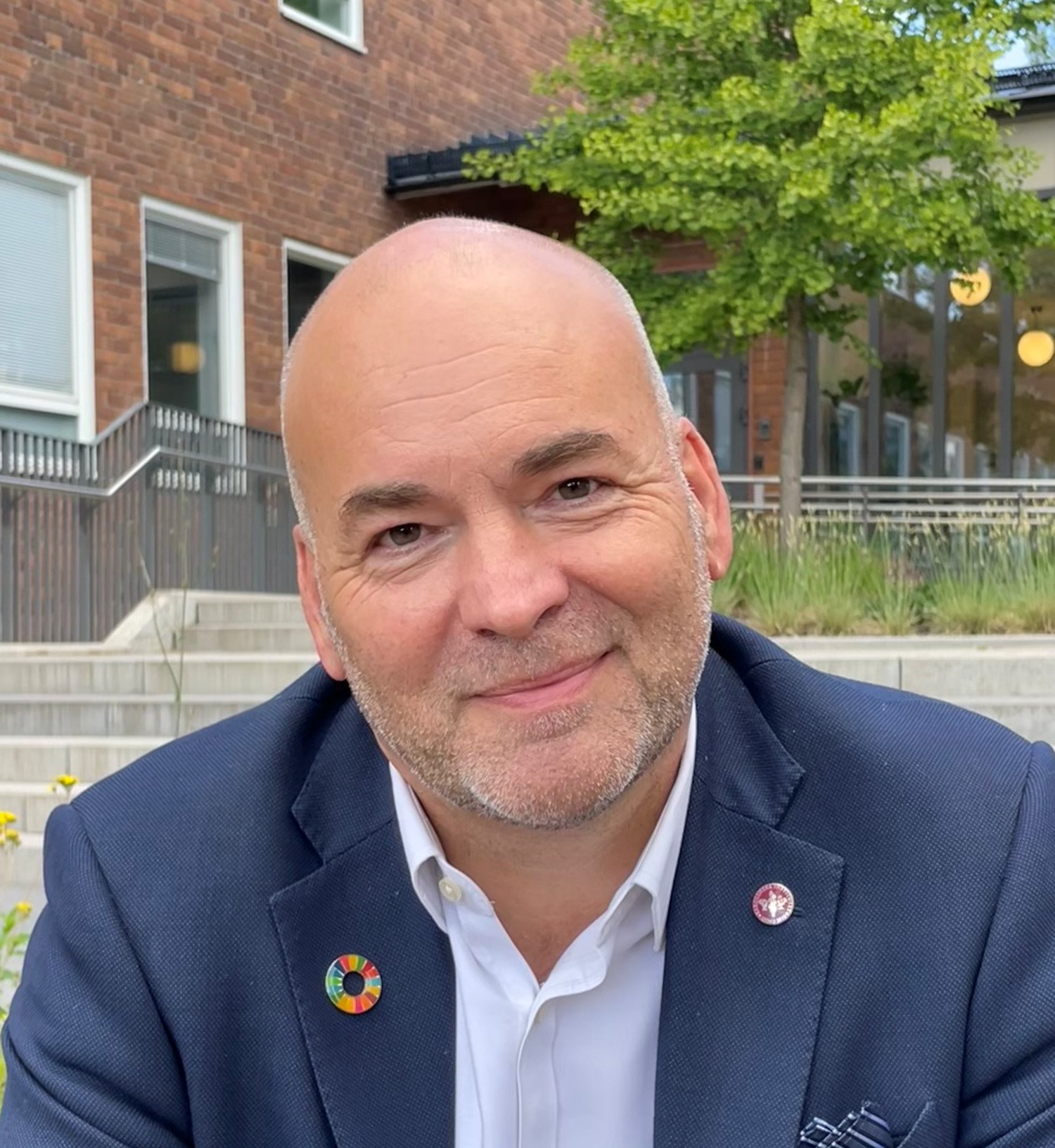 Photo: N/A
Photo: N/ARobert Harris ranked on the “Top 20 LinkedIn Influencers in Sweden in 2025”
Bob Harris has been ranked number 5 on the list “Top 20 LinkedIn Influencers in Sweden in 2025” by the platform Favikon.
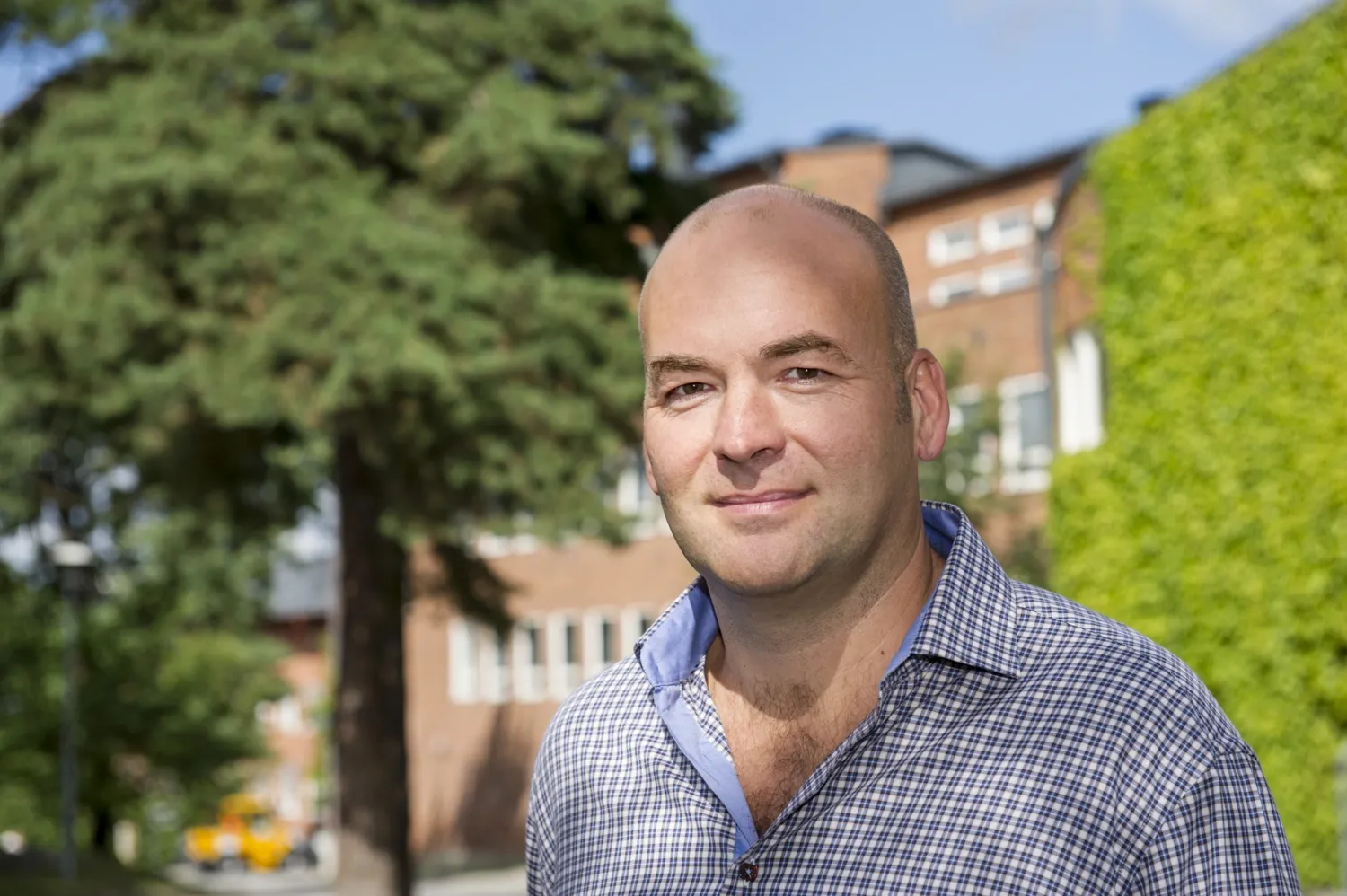 Photo: Stefan Zimmerman,Stefan Zimmerman
Photo: Stefan Zimmerman,Stefan ZimmermanBob Harris receives newly established education award
Professor Bob Harris, academic vice-president of doctoral education, has been awarded the Federation of European Biochemical Societies (FEBS) Education Award. This is the first time that the prize has been awarded.
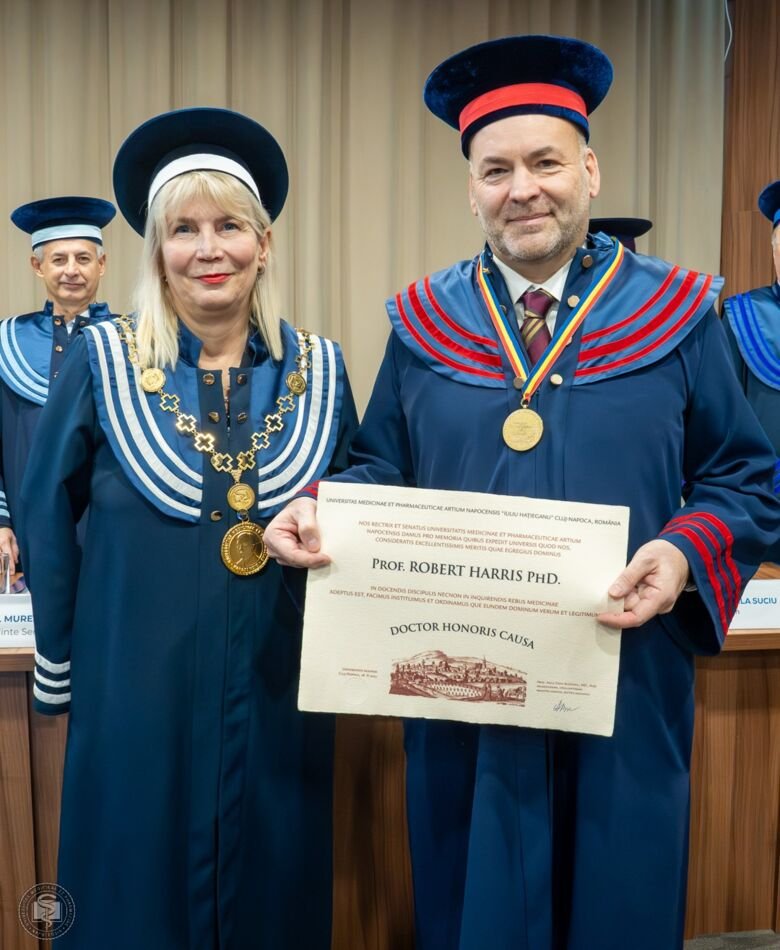 Photo: N/A.
Photo: N/A.Professor Robert Harris made honorary doctorate
Professor Robert A. Harris is made honorary doctorate at the Iuliu Hatieganu University of Medicine and Pharmacy (UMF) Cluj-Napoca, Romania. The honour is given in recognition of Bob Harris’ exceptional contributions to the development of the university, especially in the context of the European University Alliance NeurotechEU project
Our research
Immunotherapy
The Applied Immunology group is dedicated to investigation of the pathogenesis of incurable diseases affecting the Central Nervous System /CNS), including chronic Multiple Sclerosis, Amyotrophic Lateral Sclerosis, Alzheimer’s disease and Glioblastoma brain tumors. There are currently no effective therapies for any of these diseases and so our primary aim is to develop new therapies for use in these diseases. Through study of experimental diseases,our ultimate aim is to apply this knowledge to the human clinical situation.
We conduct a strongly interconnected research programme aimed at using knowledge gained from projects in basic science to applications in a clinical setting. These aims can be summarised as:
- Studying the heterogeneity of microglial function in the CNS
- Developing myeloid cell-targeted immunotherapies
- Development of novel immunotherapies using immunoparticles
Another major aim is the training of PhD students and postdoctoral fellows. We contribute to teaching in the undergraduate programs for Allergy, Immunology & Inflammation, Neuroscience and Biomedicine. Students and clinicians are welcome to conduct projects in the laboratory. The research laboratory is located in the Centre for Molecular Medicine (CMM) at the Karolinska Hospital. Within CMM, we collaborate with research groups in rheumatology, immunology, cell biology and other disciplines. We are also engaged in active collaborations with research groups at MTC, Huddinge Hospital and several international institutions.
Research projects
- Personalised myeloid cell therapy for treatment of chronic neuroinflammatory diseases
- Microglial depletion and repopulation treatment of neurodegenerative diseases
- Immunotherapy in neurological diseases using immunoparticles
We are primarily interested in understanding the pathogenesis of incurable, chronic disease states of the Central Nervous System, including ALS, MS, Alzheimer's disease and glioma brain tumors.
How can we treat or cure diseases?
There is currently no cure for the diseases we study, and existing medications are only partly effective.
Our main interest is thus on developing new strategies to reduce or abrogate disease symptoms.
We focus on using the body’s own myeloid cells as a means of treating the same individual through ‘personalised cell therapy’ or by targeting these cells for immunomodulation.
Scientific Hypothesis addressed: Adoptive transfer of pre-activated myeloid cells will be an effective treatment for neurodegenerative disease states. We use both macrophages and microglia-like cells in our studies of microglia replacement therapy.
Scientific Hypothesis addressed: Adoptive transfer of amniotic epithelial cells will be an effective treatment for neurodegenerative disease states. The stem-like immunoregulatory properties of AECs that are usually used to protect unborn infants are now applied to immunomodulate neurodegenerative disease processes, and in particular modulation of microglia function.
Publications
Selected publications
- Article: FEBS OPEN BIO. 2025;15(1):48-55Harris RA; Kazdagli H
- Article: SCIENTIFIC REPORTS. 2024;14(1):24846Min J-H; Sarlus H; Oasa S; Harris RA
- Review: FRONTIERS IN NEUROSCIENCE. 2024;18:1467333Min J-H; Sarlus H; Harris RA
- Article: BRAIN BEHAVIOR AND IMMUNITY. 2024;121:43-55Spielbauer J; Glotfelty EJ; Sarlus H; Harris RA; Heijtz RD; Karlsson TE
- Review: FRONTIERS IN MOLECULAR NEUROSCIENCE. 2024;17:1408159Min J-H; Sarlus H; Harris RA
- Article: METALLOMICS. 2024;16(5):mfae019Min J-H; Sarlus H; Harris RA
- Article: EMBO REPORTS. 2022;23(7):e54499Zhu K; Wang Y; Sarlus H; Geng K; Nutma E; Sun J; Kung S-Y; Bay C; Han J; Min J-H; Benito-Cuesta I; Lund H; Amor S; Wang J; Zhang X-M; Kutter C; Guerreiro-Cacais AO; Hogberg B; Harris RA
- Article: NATURE MEDICINE. 2021;27(4):640-646Manberg A; Skene N; Sanders F; Trusohamn M; Remnestal J; Szczepinska A; Aksoylu IS; Lonnerberg P; Ebarasi L; Wouters S; Lehmann M; Olofsson J; von Gohren Antequera I; Domaniku A; De Schaepdryver M; De Vocht J; Poesen K; Uhlen M; Anink J; Mijnsbergen C; Vergunst-Bosch H; Hubers A; Klappe U; Rodriguez-Vieitez E; Gilthorpe JD; Hedlund E; Harris RA; Aronica E; Van Damme P; Ludolph A; Veldink J; Ingre C; Nilsson P; Lewandowski SA
- Review: JOURNAL OF NEUROINFLAMMATION. 2021;18(1):74Han J; Fan Y; Zhou K; Blomgren K; Harris RA
- Article: GLIA. 2020;68(7):1466-1478Zhu K; Pieber M; Han J; Blomgren K; Zhang X-M; Harris RA; Lund H
- Article: NATURE COMMUNICATIONS. 2018;9(1):4845Lund H; Pieber M; Parsa R; Han J; Grommisch D; Ewing E; Kular L; Needhamsen M; Espinosa A; Nilsson E; Overby AK; Butovsky O; Jagodic M; Zhang X-M; Harris RA
- Article: NATURE IMMUNOLOGY. 2018;19(5):1-7Lund H; Pieber M; Parsa R; Grommisch D; Ewing E; Kular L; Han J; Zhu K; Nijssen J; Hedlund E; Needhamsen M; Ruhrmann S; Guerreiro-Cacais AO; Berglund R; Forteza MJ; Ketelhuth DFJ; Butovsky O; Jagodic M; Zhang X-M; Harris RA
- Article: GLIA. 2016;64(11):1925-1937Parsa R; Lund H; Tosevski I; Zhang X-M; Malipiero U; Beckervordersandforth J; Merkler D; Prinz M; Gyllenberg A; James T; Warnecke A; Hillert J; Alfredsson L; Kockum I; Olsson T; Fontana A; Suter T; Harris RA
- Article: JOURNAL OF EXPERIMENTAL MEDICINE. 2016;213(8):1537-1553Parsa R; Lund H; Georgoudaki A-M; Zhang X-M; Guerreiro-Cacais AO; Grommisch D; Warnecke A; Croxford AL; Jagodic M; Becher B; Karlsson MCI; Harris RA
- Article: DIABETES. 2012;61(11):2881-2892Parsa R; Andresen P; Gillett A; Mia S; Zhang X-M; Mayans S; Holmberg D; Harris RA
PhD theses
PhD students with Bob as Main Supervisor
Keying Zhu 2023-05-17
Deciphering and fine-tuning of myeloid cells in CNS demyelinating conditions
Jinming Han 2021-02-19
Repopulation of a microglia-depleted central nervous system : molecular characterization during homeostasis and disease
After leaving the lab began as a Post-doctoral fellow, Capital Hospital, Bejing, China
Melanie Pieber 2019-04-26
Myeloid cells in experimental neuropathologies
After leaving the lab began as a Post-doctoral fellow at UCB, Vancouver, Canada
Harald Lund 2018-06-01
Regulation of microglia and monocyte function by the cytokine TGF-beta
After leaving the lab began as a Post-doctoral fellow at UCLA, USA
Eyglo Gudmundsdottir 2017-11-30
The effects of parenting a child diagnosed with cancer : distress, resilience and vital exhaustion. Living with death in your face
Chao Sun 2017-04-28
Studies of b-AP15 : a novel inhibitor of proteasome deubiquitinase activity
Andreas Warnecke 2016-06-14
Post-translational modifications of myelin oligodendrocyte glycoprotein in CNS autoimmunity
After leaving the lab began at a Biotechnology company in Stockholm
Roham Parsa 2015-06-12
Innate regulation of the adaptive immune system during autoimmunity
After leaving the lab began as a Post-doctoral fellow at Rockefeller, USA
Sohel Mia 2014-04-11
Myeloid cells in autoimmune diseases
After leaving the lab began as a Post-doctoral fellow at KI
Åsa Andersson 2006-01-27
Macrophages : As central inflammatory mediators and as targets for therapeutic interventions
After leaving the lab began as a Post-doctoral fellow at UCLA, USA
Maja Wållberg 2005-05-04
Modulation of immune responses in experimental autoimmune encephalomyelitis
After leaving the lab began as a Post-doctoral fellow at Cambridge University, UK
Judit Wefer 2004-09-17
Studies of cellular pathogenesis in experimental autoimmune encephalomyelitis
After leaving the lab was Employed by Grants Office, KI
Khairul-Bariah Abdul-Majid 2002-01-11
Pathogenesis of myelin oligodendrocyte glycoprotein induced experimental autoimmune encephalomyelitis in DBA/1 mice
After leaving the lab began as a Post-doctoral fellow at Johns Hopkins University, USA
PhD students with Bob as co-supervisor
Caroline DeVisscher 2021-06-03
Characterization and long-term follow-up of Pediatric Acute-onset Neuropsychiatric Syndrome (PANS)
After completion of PhD continued as a practicing clinician
Oscar Diaz Perez 2021-05-28 - Post-doctoral fellow, USA
Impact of genetic and environmental factors in intestinal inflammation
After completion of PhD began as a Post-doctoral fellow USA
Elena Di Martino 2020-10-02
Neonatal hypoxic ischemic encephalopathy : inflammation and therapies
After completion of PhD began as a Post-doctoral fellow USA
Eliane Piket 2020-06-12
Immunopathogenesis of multiple sclerosis : big roles for small RNAs
After completion of PhD joined ImmunoIVD AB as an application specialist
Natalia Sherina 2019-12-13
On the origin of ACPA : exploring the role of P. gingivalis in the development of rheumatoid arthritis
After completion of PhD began as a Post-doctoral fellow at KI
Marie N’diaye 2018-03-16
Immunological mechanisms regulating neuroinflammation : a role for C-type lectin receptors and vitamin D
After completion of PhD began as a Post-doctoral fellow at KI
Sabrina Ruhrmann 2017-05-19
Involvement of epigenetic mechanisms in disease inheritance and pathogenesis of Multiple Sclerosis (MS) with a focus on genomic imprinting and DNA methylation in CD4+ T cells
After completion of PhD began as a Post-doctoral fellow at KI
Nataliya Tarasova 2016-06-17
Establishing a proteomics-based monocyte assay to assess differential innate immune responses
After completion of PhD began as a Post-doctoral fellow at KI
Anna Maria Marino 2012-12-07
Experimental combination therapy of brain cancer cell models
After completion of PhD began as a Post-doctoral fellow at KI
Melanie Thessen Hedreul 2012-06-15
Genetic and Immunological Regulation of Neuroinflammation
After completion of PhD continued as a research scientist at Celgene
Elizabeth Jedell 2010-12-17
Polycystic ovary syndrome: Studies of affective symptoms in association with sex steroids and evaluation of electroacupuncture and physical exercise
Alan Gillett 2010-11-19
Genetic and Immunological Mechanisms Regulating Neuroinflammation
After completion of PhD joined Merck Group, Canada
Amennai Beyeen 2010-11-12
Definition of genetic and pathogenic mechanisms regulating neuroinflammation
After completion of PhD joined Novartis, Sweden
Jan Ottervald 2009-11-27
Proteomics in neurological disease
After completion of PhD continued as a research scientist at Astra Zeneca
Anna Ökvist 2009-06-08
Synaptic plasticity in drug abuse disorders : Studies of the human post-mortem brain
After completion of PhD began as a research scientist at KaroBio
Ruxandra Covacu 2008-01-24
Adult neural stem cells in neuroinflammation
After completion of PhD began as a Post-doctoral fellow at KI
Monica Marta 2007-09-25
Gene regulation and immune mechanisms in multiple sclerosis experimental models
After completion of PhD began as a Post-doctoral fellow at Kings College London, UK
Samer Sourial 2005-10-07
Functional studies on the interaction of immunoglobulins with HIV-2 envelope
After completion of PhD began as a Medical student at KI
John Andersson (Docent) 2003-06-04
Experimental chagas disease
After completion of PhD began as a Post-doctoral fellow at NIH, USA
Maha Hamadien 2002-08-29
Parasite signalling and host responses in experimental and human African trypanosomiasis
After completion of PhD began as a Post-doctoral fellow at UCLA, USA
Saad Muhallab 2002-06-14
T cell production of cytokines, neurotrophins and MHC regulation in autoimmune neuroinflammation
After completion of PhD began as a clinician at Linköping Hospital, Sweden
Ahmed Sharafeldin 2001-12-14
Immunological studies in the brain and signaling pathways in experimental African trypanosomiasis
After completion of PhD began as a Post-doctoral fellow at KI
Dan Sunnemark 1998-05-20
Immunopathogenesis of experimental Chagas' disease
After completion of PhD began as a research scientist at Astra Zeneca
Azael Saldana (Docent) 1997-11-19
Immunobiochemical significance of Trypanosoma rangeli in the study of Trypanosoma cruzi
After completion of PhD began as a Post-doctoral fellow at Panama University and later became Professor
Funding
Swedish Medical Research Council (VR)
Alltid Litt Sterkere
Neurofonden
Thierry Latran Foundation
Stiftelse Olle Engkvist
Åhlen stiftelse
Ulla Carin Lindquist Foundation
CancerFonden
Karolinska Institutet KID
Staff and contact
Group leader
- Robert HarrisProfessor | Academic vice president
All members of the group
- Yigit Koray BabalPostdoctoral Studies
- Stefan BencinaPhd Student
- Yuxi GuoPhd Student
- Robert HarrisProfessor | Academic vice president
- Sebastian LewandowskiSenior Research Specialist
- Kuo LiaoPhd Student
- Per M RoosAffiliated to Research | Docent
- Heela SarlusResearch Specialist
- Aditya SinghAffiliated to Research
- Dan SunnemarkAffiliated to Research
- Giulia Adriana VirgilioPhd Student
- Yangfan ZhouPostdoctoral Studies
- Keying ZhuPostdoctoral Researcher
FAQ
Some frequently asked questions
Do you have a PhD position available?
I have had good success in securing faculty (KID) funding for several PhD students, and these positions are advertised at KI Jobb. Social skills, ability to work collaboratively and a genuine interest in our work are all prerequisites for being accepted. A 4-year PhD training should not be something you do because you have nothing better to do – you should have a vocation for science and in particular the science we do. I am happy to receive enquiries from people fulfilling these requirements.
Do you have a Masters project position available?
I usually have one Masters project student per term working together with one of my PhD students. You are welcome to contact me and to express an interest in working within one of the projects described in the lab profile. Social skills, ability to work collaboratively and a genuine interest in our work are all prerequisites for being accepted.
Do you have a postdoc position available?
Funding for postdocs is often the hardest type of funding to secure. If you are interested in working in my lab you are welcome to contact me and submit a CV and a statement describing your specific research interests. If funding is available in the lab then great. If not you will be expected to provide your own funding or strategy for securing financing.
Do you accept volunteers?
I do not accept volunteers. If you are making a valuable contribution to my lab you will get paid for your efforts.
Team leader
A team leader operates as an additional leadership support to our research group leader and conducts its own research.
Sebastian Lewandovski
Sebastian Lewandowski
Team leader - Neurovascular Injury and NeurodegerationTeam members (Sebastian Lewandowski's team)
Research Highlights
Perivascular fibroblast cells contribute to ALS neurodegeneration
Team leader Sebastian Lewandowski led a study that identified a rare brain cell type called ’perivascular fibroblast’ that becomes activated in early, asymptomatic stages of amyotrophic lateral sclerosis (ALS). These fibroblasts remodel the structure of brain vessels by depositing the COL6A1 and SPP1 proteins. These protein biomarkers in ALS patient plasma indicate short survival with stronger effects than the classical neurofilament biomarkers.
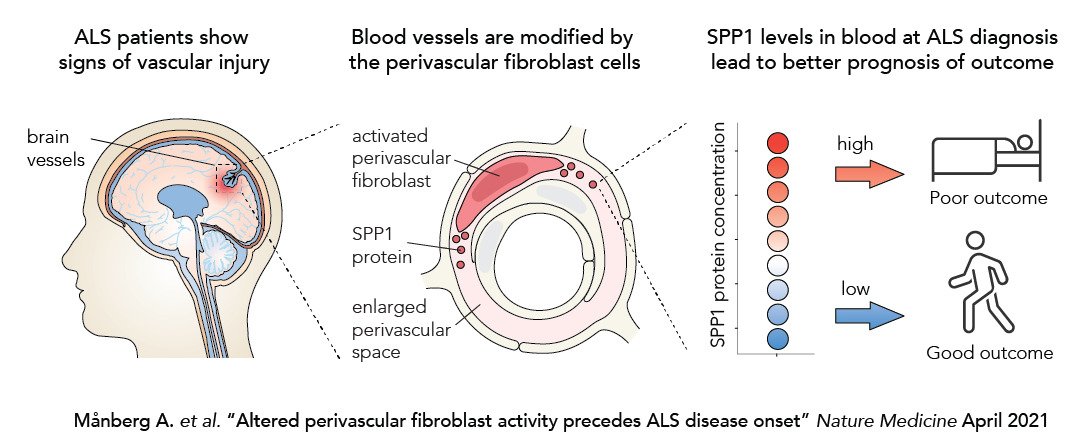
Månberg A, Skene N, Sanders F, Trusohamn M, Remnestål J, Szczepińska A, Aksoylu IS, Lönnerberg P, Ebarasi L, Wouters S, Lehmann M, Olofsson J, Von Gohren Antequera I, Domaniku A, De Schaepdryver M, De Vocht J, Poesen K, Uhlén M, Anink J, Mijnsbergen C, Vergunst-Bosch H, Hübers A, Kläppe U, Rodriguez-Vieitez E, Gilthorpe JD, Hedlund E, Harris RA, Aronica E, Van Damme P, Ludolph A, Veldink J, Ingre C, Nilsson P, Lewandowski SA.
Altered perivascular fibroblast activity precedes ALS disease onset. Nature Medicine 2021 27:640–646
A new therapeutic target for modulating the harmful effects of demyelination
By employing loss-of-function and gain-of-function studies, PhD student Keying Zhu revealed that microglial function is highly affected in terms of the functional activity of the transient receptor potential vanilloid 1 (TRPV1). Global activation of TRPV1 drives microglia to a demyelinating state and enhances microglial phagocytosis. TRPV1 is thus a candidate target for immunotherapy in neurodegenerative diseases.
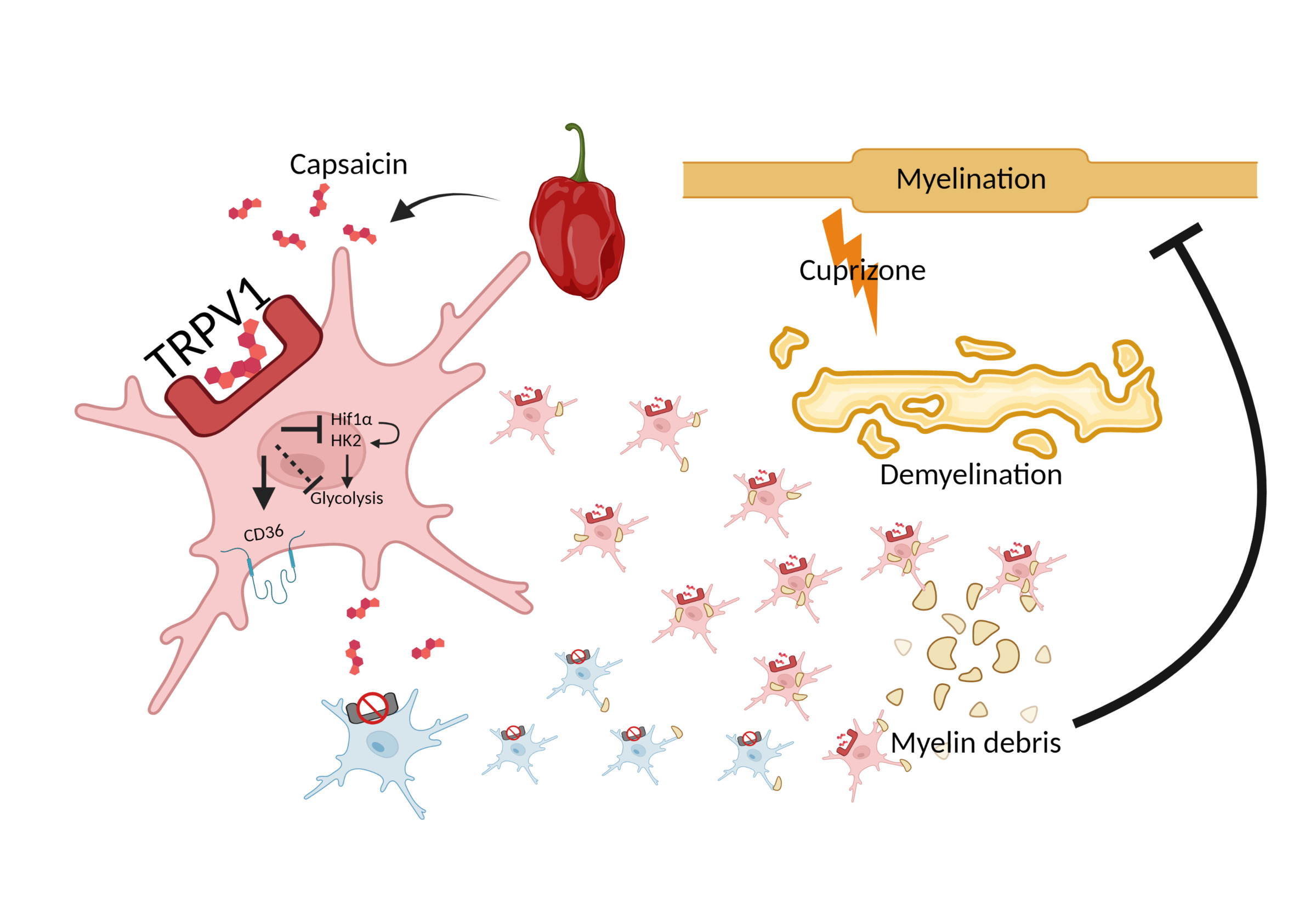
Jinxian Sun, Ke-ing Zhu, Yumeng Wang, Dan-ie Wang, Mi-zhen Zhang, Heela Sarlus, Irene Benito-Cuesta, Xiaoqiang Zhao, Zaofeng Zou, Qingyang Zhong, Yi Feng, Shuai Wu, Yanqing Wang, Robert A Harris, Jun Wang. Activation of TRPV1 receptor facilitates myelin repair following demyelination via the regulation of microglial function. Acta Pharmacologica Sinica 44 (4), 766-779
Specifically inhibiting microglial activation reduces neuroinflammation:
PhD student Keying Zhu devised and conducted this project, in which he developed a new form of immunotherapy. Through drug screening of pre-existing drugs, Keying identified Topetecan as an inhibitor of Topisomerase 1, and proved this protein had a role in neuroinflammation. Myeloid-specific TOP1 inhibition using TopoGami significantly suppresses the inflammatory response in microglia and mitigates MS-like disease progression.
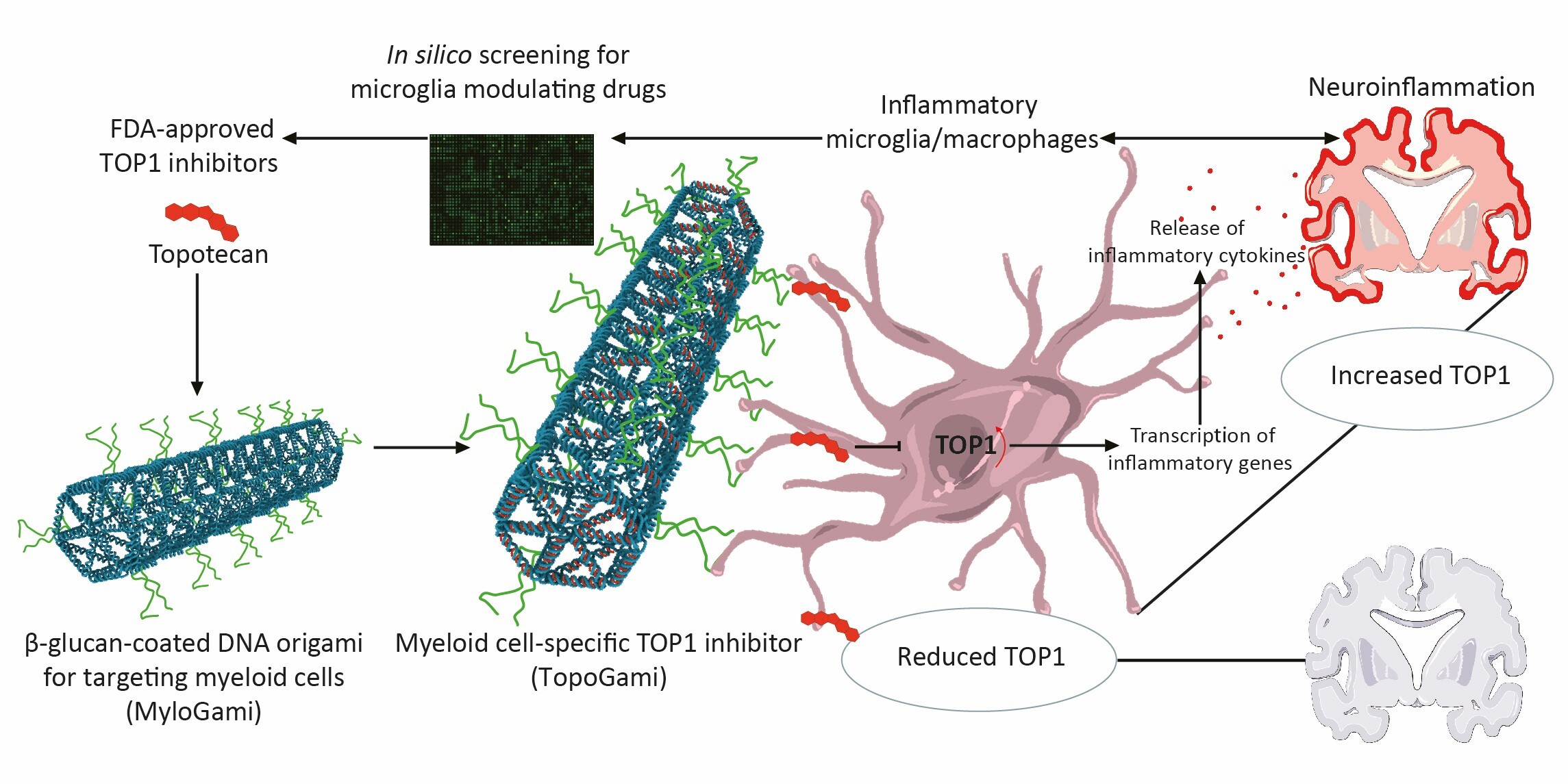
Zhu K, Wang Y, Sarlus H, Geng K, Nutma E, Sun J, Kung SY, Bay C, Han J, Min JH, Benito-Cuesta I, Lund H, Amor S, Wang J, Zhang XM, Kutter C, Guerreiro-Cacais AO, Högberg B, Harris RA. Myeloid cell-specific topoisomerase 1 inhibition using DNA origami mitigates neuroinflammation. EMBO Rep. 2022 23(7):e54499.
Understanding CNS niche occupancy by microglia and macrophages in health and disease:
In the first of two studies led by PhD student Harald Lund we developed a novel model of microglia depletion using diptheria toxin expressed under the CX3CR1 receptor, which is highly expressed by microglia. The CNS did not allow the permanent depletion of its myeloid cells, and thus blood-circulating monocytes were accepted into the empty niche and adapted to the new environment. The characterization of this process was described in the first Nature Communications paper. We then depleted TGFbeta receptor signaling on the infiltrating monocytes, and this led to development of a novel neurodegenerative disease state that we characterised in the second Nature Immunology paper.
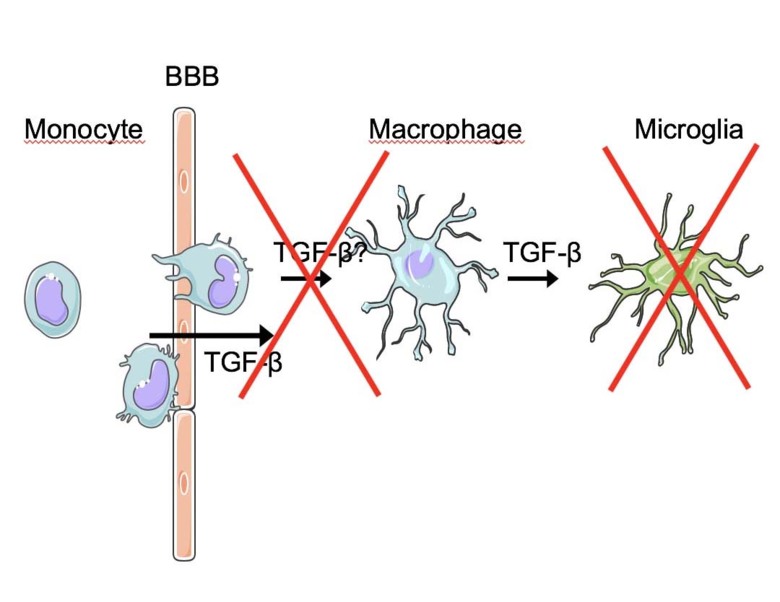
Lund H, Pieber M, Parsa R, Han J, Grommisch D, Ewing E, Kular L, Needhamsen M, Butovsky O, Jagodic M, Zhang X-M, Harris RA: Competitive repopulation of an empty microglial niche gives rise to functionally distinct subsets of microglia-like cells. Nature Communications 2018 9:4845
Lund H, Pieber M, Parsa R, Grommisch D, Ewing E, Kular L, Han J, Zhu K, Nijsen J, Hedlund E, Needhamsen M, Ruhrmann S, Ortlieb Guerreiro Cacais A, Berglund R, Forteza MJ, Ketelhuth DFJ, Butovsky O, Jagodic M, Zhang X-M, Harris RA: Fatal demyelinating disease is induced by monocyte-derived macrophages in the absence of TGF-β signaling. Nature Immunology 2018;19:1-7
The consequences of post-translational modifications for autoantigens:
In the first of these 3 studies led by PhD student Andreas Warnecke he devised, wrote a script for and further developed a programme for visualising the 3-d form of post-translationally modified proteins using known structures, a resource which is openly available online.
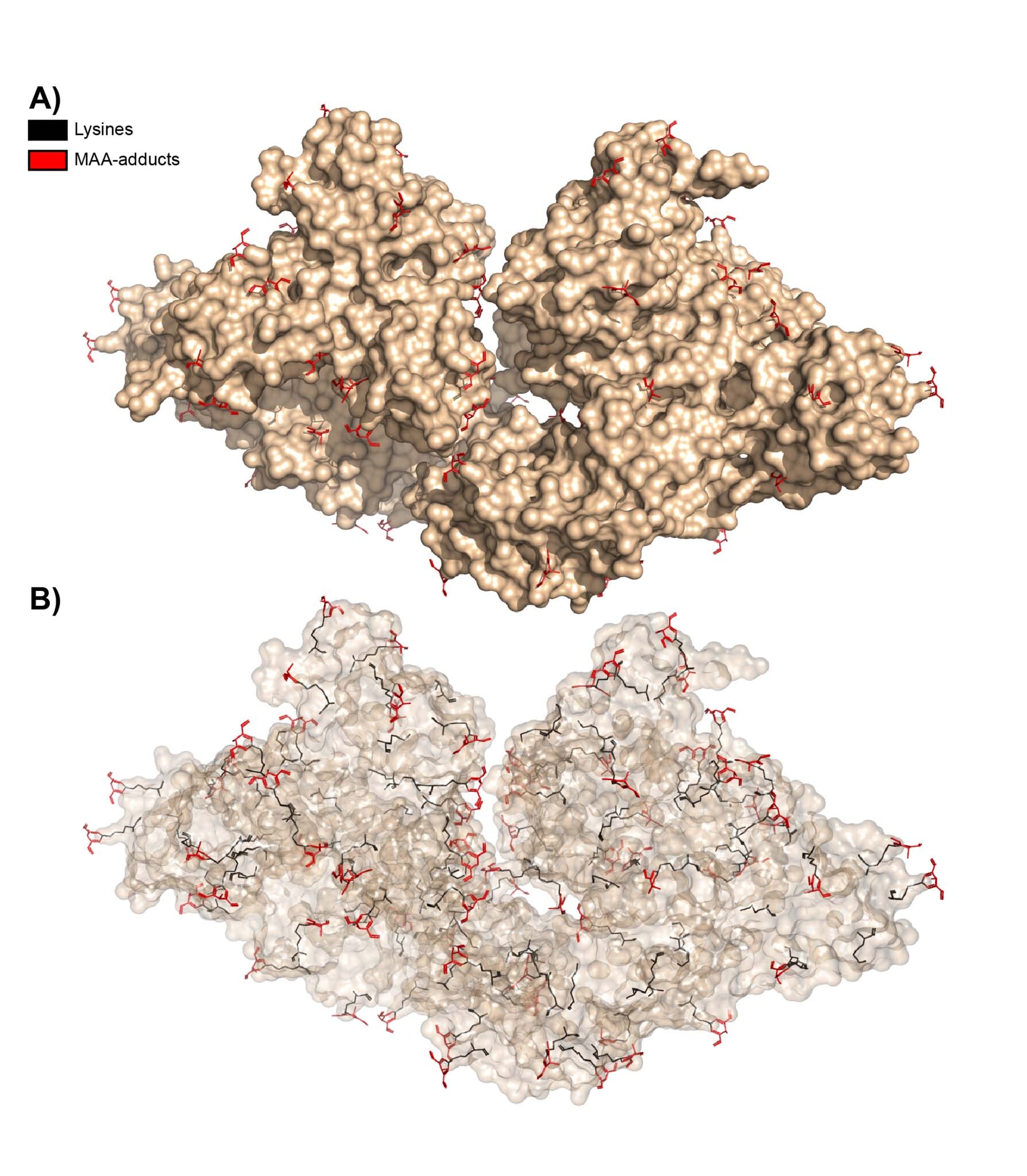
Warnecke A, Sandalova T, Achour A, Harris RA: PyTMs: A useful PyMOL plugin for modeling common post-translational modifications. BMC Bioinformatics 2014;15:370
In subsequent studies Andreas determined that the functional consequences of PTM modification of autioantigens determined the molecular interactions with myeloid cells, and that the immunological outcome was MHC-dependent:
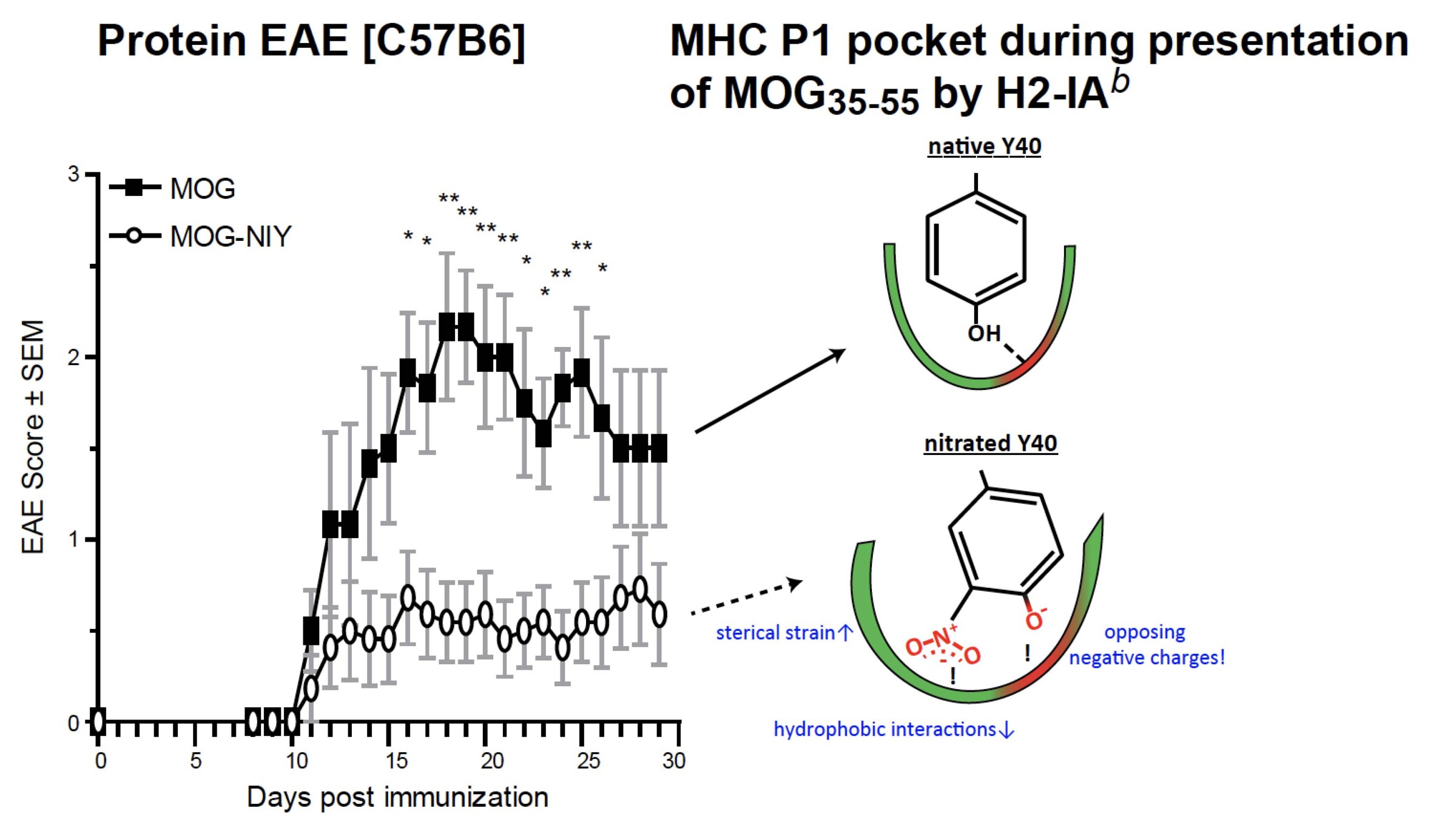
Warnecke A, Musunuri S, N'diaye M, Sandalova T, Achour A, Bergquist J, Harris RA: Nitration of MOG diminishes its encephalitogenicity depending on MHC haplotype. Journal of Neuroimmunology 2017;303:1-12
Warnecke A, Abele S, Musunuri S, Bergquist J, Harris RA: Scavenger Receptor A mediates the clearance and immunological screening of MDA-modified antigen by M2 type macrophages. NeuroMolecular Medicine 2017;9:463-479
Immunosuppressive macrophage cell therapy modulates development of autoimmune disease:
In a series of studies we developed a robust protocol for induction of potently immunosuppressive macrophages that form the foundation of our concept of myeloid cell therapy.
In the first of these studies PhD student Roham Parsa demonstrated a significant prevention of development of Type 1 diabetes following macrophage cell therapy. The effect was even more dramatic considering that the therapy was initiated directly before disease onset, a timepoint proven difficult to immunomodulate in most other therapy studies in the NOD Type 1 Diabetes model:
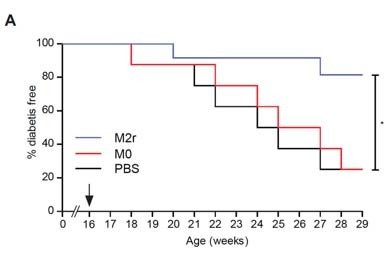
Parsa R, Andresen P, Gillett A, Mia S, Zhang X-M, Mayans S, Holmberg D, Harris RA: Adoptive Transfer of Immunomodulatory M2 Macrophages Prevents Type 1 Diabetes in NOD Mice. Diabetes 2012;61:2881-92
Postdoc Xingmei Zhang conducted a similar study in a model of neuroinflammation, and likewise could demonstrate a significant reduction in development of paralytic disease, even when the therapy was initiated during the chronic disease phase, a timepoint again difficult to modulate in previous attempts by other research groups:
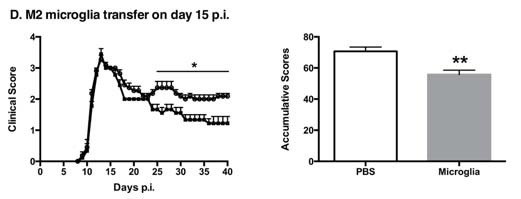
Zhang X-M, Lund H, Mia S, Parsa R & Harris RA: Adoptive transfer of cytokine-induced immunomodulatory adult microglia attenuates experimental autoimmune encephalomyelitis in DBA/1 mice. Glia 2014;62:5 804-817
Importantly, PhD student Sohel Mia could then use the same stimulation protocol to prove that human macrophages from autoimmune patients were efficient at inhibiting their own pathogenic T cells in in vitro assays, providing a translational proof-of-concept.
Mia, S, Warnecke A, Zhang X-M, Harris RA: An optimized protocol for human M2 macrophages using M-CSF and IL-4/IL-10/TGF-β yields a dominant immunosuppressive phenotype. Scandanavian Journal Immunology 2014;79:305-14
One of the hallmark cytokines produced by the immunosuppressive macrophages is TGFβ, and the importance of this cytokine in maintaining cellular homeostasis was exemplified in PhD student Roham Parsa's study which revealed a worsening of neuroinflammation in the absence of TGFβ signaling:
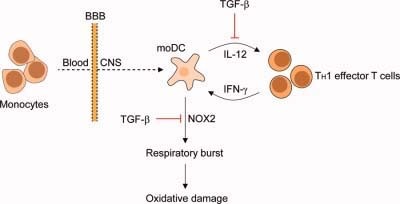
Parsa R, Lund H, Tosevski I, Zhang XM, Malipiero U, Beckervordersandforth J, Merkler D, Prinz M, Gyllenberg A, James T, Warnecke A, Hillert J, Alfredsson L, Kockum I, Olsson T, Fontana A, Suter T, Harris RA: TGFβ regulates persistent neuroinflammation by controlling Th1 polarization and ROS production via monocyte-derived dendritic cells. Glia 2016;64:1925-37
A novel principle for improved humoral vaccination
In this study PhD student Roham Parsa set out to generate a macrophage-deficient mouse strain, but instead developed a neutrophil-deficient mouse strain. Through characterising the respective roles of neutrophils during the early and late phases of immune activation, we could conclude that manipulation of neutrophil numbers at the site of inoculation would be a means of generating enhanced antibody responses to the injected substance:
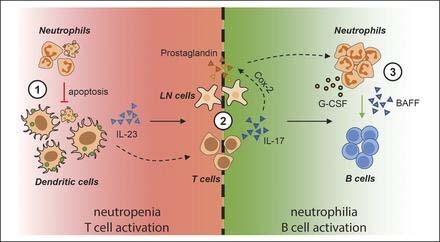
Parsa R, Lund L, Georgoudaki A-M, Zhang X-M, Ortlieb Guerreiro-Cacais A, Grommisch D, Warnecke A, Croxford AL, Jagodic M, Becher B, Karlsson MCI, Harris RA: BAFF-secreting neutrophils drive plasma cell genesis during emergency granulopoiesis. Journal of Experimental Medicine 2016;213:1537-53
News & Media
Video links
Controversies in neurology_på svenska - Är ALS en metallintoxikation? - Med. dr and Docent Per Roos
https://play.ki.se/media/t/0_6dv8svdg
Prof. Robert Harris | Science Leadership & Immunotherapy at Karolinska Institutet
https://www.youtube.com/watch?v=Tq2gUUtDUvE
The Real MAD Scientist | Dr. Robert A. Harris
https://www.youtube.com/watch?v=qPydtMFBGi8
Why you should be a MAD scientist - Prof. Robert Harris, Karolinska Institute shares academic advice
https://www.youtube.com/watch?v=m2OCAN8xzBc
Fighting Brain Tumors and Alzheimers
https://youtu.be/MKKhGbUa6-c
#followup with Robert Harris - some interesting news
https://youtu.be/JFxMMrDsOYY
Introducing Neurotech2040
https://youtu.be/VR35CRd3Tb0
7th Trials Methodology Symposium 2021, Prof. Robert Harris
https://youtu.be/GrXr7tAnWI0
Nationella Dekanmötet i Lund 2019
https://youtu.be/RZbu44CbWCA
Media
Bob Harris recently visited RU and gave a talk about his research, highlighting the growing collaboration between RU and leading international neuroscience researchers - September 18, 2025
A growing collaboration between RU and leading international neuroscience researchers
Nature Careers podcast: 10th February 2023.
Showing the love as a science leader: the emotional side of empowering and inspiring others https://www.nature.com/articles/d41586-023-00417-2
Professor Bob Harris – with an award and a sword
https://news.ki.se/professor-bob-harris-with-an-award-and-a-sword
Robert Harris (Director of post graduation studies at Karolinska Institute and President of ORPHEUS) visited the Escola de Medicina
https://twitter.com/icvs_uminho/status/1045672561080750082
https://he-il.facebook.com/dsa.karolinska/photos/5209863485714396/
Reflections and visions for modernization: why doctoral education needs TECH
https://www.qqi.ie/sites/default/files/2022-10/10.20-11.05%2019%20Oct%20-%20%20Bob%20Harris%20-%20Breakout%20-%20Doctoral%20Education%20-%20Hogan%20Suite.pdf
News archive
